

[Below: Magnificent. Note that the streamers with the flags say names of liberated German lands like Danzig, Memel, Sudetenland, etc. Wherever this was, it was beautiful and mysterious...]

[Below: Reverse of postcard. The cancel on the left says:
'Wien Messepalast - Ausstellung'
(Vienna Trade Fair Palace).
On the right the it says:
'Wien
Georg Ritter von Schönerer
Künder und
Wegbereiter des
Grossdeutschen
Reiches
Schönerer-Ausstellung Messe Palast 26.Sept-8.Nov.'
(Vienna
Georg Ritter von Schönerer
Herald and
pioneer of the
Greater German
Empire
Schönerer Exhibition Trade Palace 26.Sept-8.Nov.)
Georg Ritter von Schönerer was an Austrian politician and influential German nationalist. He is said to have been an influence on Adolf Hitler in his early days.]

[Below: Georg Ritter von Schönerer (July 17, 1842 – August 14, 1921).]


[Below: Sent from Austria to Luxemberg on March 1, 1944. Okay, let's look at the back of the postcard. Front.]

[Below: Wait a minute! 'Heil Hitler! Heil Erwin'?! Hehe. Kinda ironic and strange eh? Heil is apparently a name? Back.]


[Below: I like this postcard, it's different. Check out the 'Dragon's Teeth' behind him. I remember reading that the German government scrambled to bury the old fortifications, lest a 'neo-Nazi' might make some monument out of them. Historians always beg them to let them study it and the German government always says NO! Too damn risky. Ridiculous. Imagine being so afraid of something you even have to hide a tank trap 75 years later, lest your enemy worship it. Insanity. Front.]

[Below: This says:
'Heiteres
der Front - der Heimat'
(Cheerful
the Front - the Homeland)
It was sent from the field by a soldier on April 27, 1942. Back.]


[Below: Hmm... an innocent envelope, with a 1936 Olympics cancel... yet hiding total inhuman evil. Front.]

[Below: BOO!!! IG FARBEN!!! They manufactured the magic poisonous gas ZYKLON B that killed zillions of people. Back.]

[Below: OMG I'm gonna cry... Back.]


[Below: This envelope was sent from Leipzig and was canceled on November 30, 1933. It bears the logo of a company called 'Anastasia - Spezialanstalt für Anastatischen Druck', which translates as 'Anastasia - Specialized Institute for Anastatic Printing'. Anastatic printing was 'Anastatic printing was a form of facsimile reproduction invented and developed in Germany in the early 1840s... Any illustration or text based on oil-based ink could be reproduced.' Hmm, strange, I've never heard of this. Anyway, the stamp shows Siegfried slaying the dragon, this comes from one of my favorite sets of stamps released during the National Socialist era. They depict various legends.]

[Below: A delightful little owl, looking rather pompous, sitting on a tree stump. Close-up.]


[Below: Fewa (abbreviation for Feinwaschmittel, which means 'delicate detergent') is the name for the first fully synthetic detergent in the world, developed in 1932, and still in operation today. Up until WWII it was the second most popular detergent in Germany.]

[Below: Note that the woman is made of detergent bubbles and is embracing a dress. Superimposed over her are the words 'Fein auf Fein' (Fine on Fine). Close-up.]

[Below: Here is a Fewa advertisement from the Berliner Illustrirte Zeitung, October 10, 1940 - number 41.]
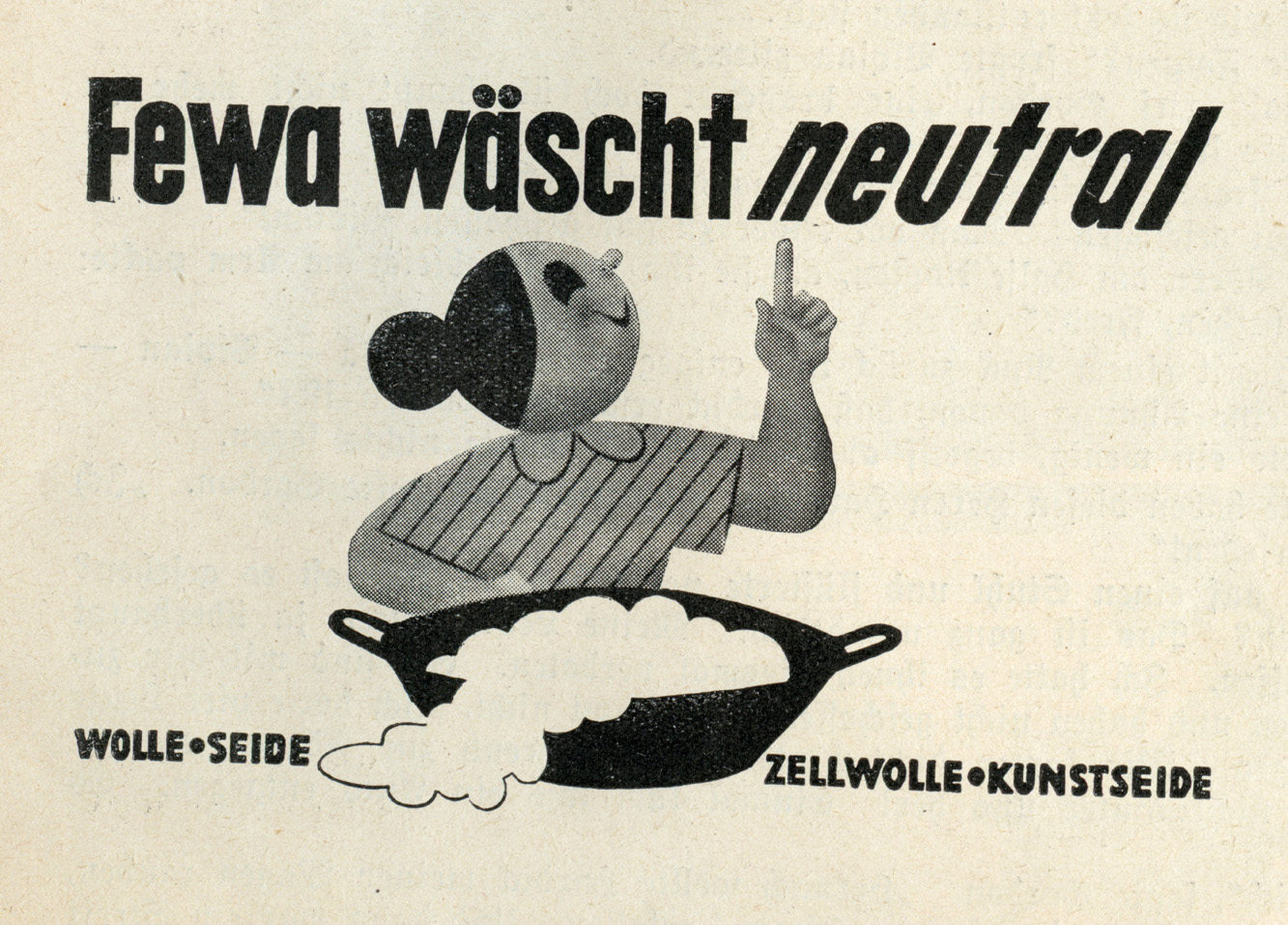

[Below: Canceled on January 11, 1930, this is one of the most heavy metal-looking logos I've ever seen for its age! The font is exactly what you would see on a 1980s metal band. So strange... anyway, this is from Metalluk Technische Handels - u. Fabrikations - Gesellschaft (Metalluk Technical Trading and Manufacturing Company). To my surprise, this company is also still around. Its website describes it as 'The company METALLUK BAUSCHER GMBH & CO. KG, is a Manufacturer/Producer, founded in 1924, which operates in the Information technology - data processing media industry. It also operates in the Metals, precious and special industries.]

[Below: The great-grandfather of heavy metal logos. Close-up.]


[Below: Here is a an envelope from the
'Reichsbund der Philatelisten, e.V.
4. Reichsbundestag,
45. Deutscher Philatelistentag'.
(Reichs Organization of Philatelists, e.V.
4th Reichs Organization Day,
45th German Philatelists' Day).
The stamp shown here is from 1862, Bayern is Bavaria.]

[Below: Wow they actually pretty much printed the swastika correctly. Quite a feat for how small it is. Close-up.]

[Below: The Germans were masters at making the most detailed and beautiful cancels, especially in the Third Reich. 'Hauptstadt der Bewegung' (Capital of the Movement). Close-up.]


[Below: Here is the postcard version of the envelope above, except this is for airmail.]

[Below: Note the eagle stamp on this one signifying airmail, versus the Hindenburg stamp on the envelope above. Close-up.]


[Below:
'Johannes Clasen
Baumschulen'
(Johannes Clasen
Nurseries)
Again, I'm surprised to learn that this company is still around as well! They were founded in 1910. This is a cool-looking envelope. The colors of the stamps match it very well.]

[Below: Close-up.]


[Below: This is a neat one, it was canceled on December 29, 1941. Not only is it red, but the logo is super cool. This is a business postcard. Ravenstein, as you'll see below, is a publishing house that was founded in 1830! It was in business until 2001 and is considered the 2nd oldest continuously operating printing house in Germany. This was sent to a bookstore...]

[Below: Close-up.]

[Below: This says (on the left, bottom):
'Alle Ravenstein=Karten und =Führer
dürfen ohne Einschränkung im Inland verkauft werden!'
(All Ravenstein=Maps and =Guides may be sold domestically without restriction!)
And on the right, bottom, it says:
'Ravensteins Geographische
Verlagsanstalt und Druckerei'
(Ravenstein's Geographical Publishing House and Printing Office)
Back of postcard.]


[Below: The eagles on this envelope are very detailed. It says:
'Per Eilboten
Doppel-Adler Marke
H. & F. Adler
Mech. Sportkleiderfabriken'
(By Express Messenger
Double Eagle Brand
H. & F. Eagle
Mech. Sportswear factories)
This was canceled on October 9, 1933. I couldn't find anything on this company...]

[Below: Close-up.]


[Below: This is an envelope canceled on June 4, 1936. It says:
'Kunst und Antquitäten Rundschau'
(Art and Antique Review)
Some sort of art magazine? At the top it says 'Drucksache' which just means 'printed material', which would qualify for a special postal rate. On the cancel, which is called a machine cancel, since it was run through a machine instead of a human being canceling it, it says 'Benutzt die Luftpost!' means 'Use the Airmail!']

[Below: Close-up.]


[Below: Okay, this was canceled on November 24, 1937, first we'll look at the cancel:
'4.u.5. Dezember 1937
Briefmarken Austellung
für das W.H.W. (Winterhilfswerk des Deutschen Volkes)
(December 4th and 5th 1937
Stamp exhibition
for the W.H.W. (Winter Relief of the German People)
And on the bottom it says:
'Verein Bremer
Briefmarken-Sammler e.V.
(Gegr 1909)
im Landesverband Weser-Ems
des Reichsbundes der Philatelisten
BREMEN'
(Association of Bremen
Stamp Collector e.V.
(founded 1909)
in the regional association Weser-Ems
of the Reichs Organization of Philatelists
BREMEN)
The eagle is holding three postage stamps with the letters 'RdP' for Reichsbundes der Philatelisten (Reichs Organization of Philatelists).]

[Below: Close-up.]


[Below: This is pretty cool. I like birds, especially after raising five starlings from hatchlings to the day they flew away. Anyway, this was canceled on February 22, 1937 and says:
'Ornis
Verein Für
Vogelschutz
U.=Pflege
Leipzig'
(Ornis {ornis is a bird, or 'the birds collectively of a region'}
Association for
Bird Protection
and Care
Leipzig).]

[Below: Close-up.]

[Below: A very cool stamp design. Close-up.]

[Below: My little birds in a box. When I got them they were bald, pathetic little things.]

[Below: My favorite of the five birds. He was the strongest, smartest and bravest of all the birds. He would fly/jump up to the edge of the box and sit there while I was feeding them.]


[Below: This was canceled on October 3, 1936 and is a business meter envelope. It says:
'Christofstal ein klang voll Tatkraft und Gelingen'
(Christofstal a sound full of energy and success)
Christofstal is a place in the Black Forest of Germany located in Baden-Württemberg.]

[Below: . Close-up.]


[Below: This says:
'Volksbund
Deutsche
Kriegs=
gräber=
fürsorge'
(German
War
Graves
Commission).
As you can see this is an example of a string of words being connected, which looks strange to an English speaker: Kriegsgräberfürsorge. ReaderIhopeyouhaveahappyKaliYuga.]

[Below: Close-up.]


[Below: Another German War Graves Commision envelope. This one is addressed to:
'An die
Bundesgeschäftsstelle des Volksbundes
Deutsche Kriegsgräberfürsorge'
(To the
Federal Office of the
German War Graves Commission)
The envelope above was from Munich, this one is from Königsberg.]

[Below: Close-up.]


[Below: This says 'Schwäbischer Merkur' (Swabian Mercury), but I couldn't find any trace of what this once was. Stuttgart has a famous Mercury statue. It was damaged in WWII and repaired in the 1950s. Swabia is a cultural, historic and linguistic region in southwestern Germany. The cancel, from January 21, 1935, says:
'Radfahrer!
halte den
Rückstrahler
stets in Ordnung'
(Cyclists!
always place the
reflector
correctly!)]

[Below: Mercury is the Roman name of the Greek god Hermes. He is known to be the the most clever of the Olympian gods and serves as messenger for all the other gods. Close-up.]


[Below: Speaking of Mercury, here is a very cool envelope featuring him. It was canceled on October 4, 1919 in Frankfurt. It says:
'Erste
Internationale
Einfuhr-Messe
Frankfurt'
(First
International
Import Fair
Frankfurt)]
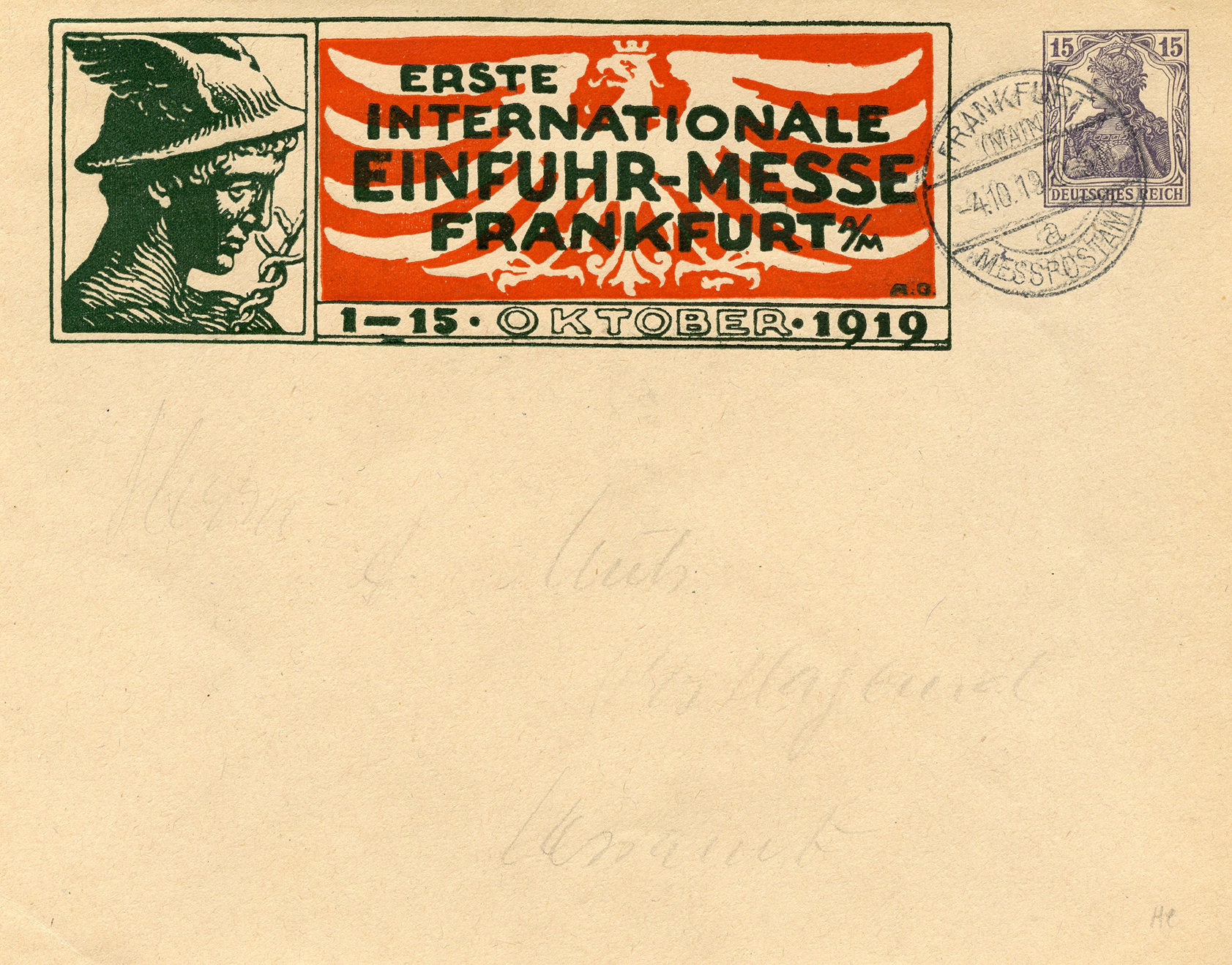
[Below: Close-up.]


[Below: This special envelope, from January 1937, shows Germany's 'lost colonies' (stolen) and advertises a 'colonial stamp show'. It also has a special cancel from Berlin-Pankow (Pankow is the most populous and the second largest borough in Berlin).]
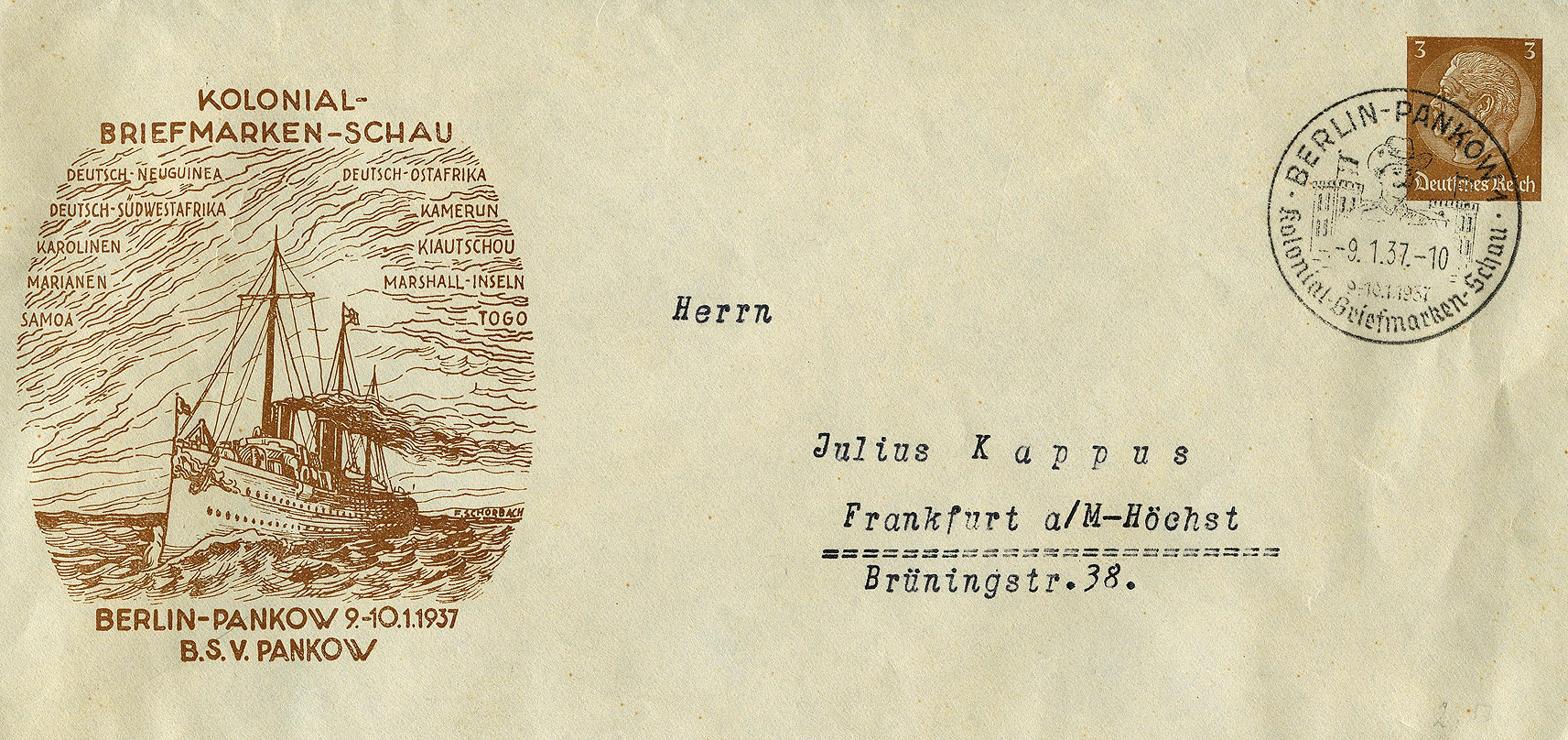
[Below: . Close-up of cancel.]


[Below: This is sent from a winery/wine wholesaler. It says:
'Weingutsbesitzer - Weingrosshandlung'
(Winery owner - wine wholesaler)
The business is in Traben-Trarbach, which is a town in the Bernkastel-Wittlich district in Rhineland-Palatinate, Germany. You'll notice the 'A.c.' stamp in a circle. This is a censor mark. Furthermore, on the lower right you can see a boxed '68', which denotes the individual censor who looked this over.]

[Below: Close-up.]


[Below: This postcard is from March 12, 1943 and from the VFL, or 'Verein für Leibesübungen' (Association for Physical Exercise). This is the first time I've heard of this organization.]

[Below: Close-up.]

[Below: Reverse of postcard. This says:
'Lieber Kamerad, liebe Kameradin! Wie bereits durch Presse und Rundfunk bekanntgeben worden ist, mußten wir unsere 4.Kriegsturn schau auf sonntag, 21.März verlegen. Beginn wieder um 16 Uhr. Die Karten behalten ihre Gültigkeit. Ich bitte nun nochmals recht herzlich, die jetzt gewonnene Zeit auszunützen, damit das waltgestechte Ziel erzwungen wird: Der Ausverkauf des Kuppelsaales!
In alter Verbundenheit
Heil Hitler!'
(Dear comrade, dear comrades! As has already been announced by the press and radio, we had to postpone our 4th war show to Sunday, March 21st. Start again at 4 p.m. The tickets remain valid. Once again, I would like to ask you to make use of the time now gained so that the most difficult goal is enforced: the sale of the domed hall!
In old solidarity
Heil Hitler!)]


[Below: This is a cool postcard from January 12, 1940 from a 'Buchhandlung' (Bookstore). The cancel is from Munich and says 'Hauptstadt der Bewegung' (Capital of the Movement).]

[Below: Close-up.]


[Below: This is so cool-looking. It was sent in December of 1941 from the German Entomology Institute in Berlin to Stockholm, Sweden.]

[Below: Close-up.]

[Below: Back of envelope showing censor.]


[Below: Another cool insect envelope. This one is from Louis Mewes and says 'Samenkulturen' (seed crops). It was sent from Blankenburg, Germany, on August 8, 1941.]

[Below: Close-up.]

[Below: Graphic on the back of the envelope. It says 'Rast ich, Rost ich' (I Rest, I Rust).]


[Below: Wow, a lot is going on here. This is an interesting-looking envelope for sure. The grey Hitler stamps are connected upside down in relation to each other. This is called a 'tête-bêche'. The other stamps (of Hindenburg) are connnected and contain a propaganda label. The stamps are different you'll note, this is called a 'se-tenant'. The German word for both tête-bêche and se-tenant is 'zusammendrucke'. Sometimes different combinations can be worth a ton of money. This was sent in 1942. You'll also note this has large oval cancels on the stamps, these are special train cancels, meaning it was sent by a train. It says:
'Dahlem & Co. m.b.H.
Import. Export
Koblenz-Pfaffendorf a. Rh.
Fernuf 3625
Ein
Körnchen
Fan-Tai
Blumenzarten Atem
Wirksamer
Atem-Schutz
Fan-Tai
Der Wirksame Atemschutz'
The label with the stamps says:
'Unterstützt
die
NS.=Volks=
wohlfahrt!'
(Dahlem & Co. m.b.H.
Import. Export
Koblenz-Pfaffendorf a. Rh.
Fernuf 3625
One
Granule
Fan-Tai
Flowery breath
Effective
Respiratory protection
Fan-Tai
Effective respiratory protection
The label with the stamps says:
Supported
the
NS.=Peoples=
welfare!)
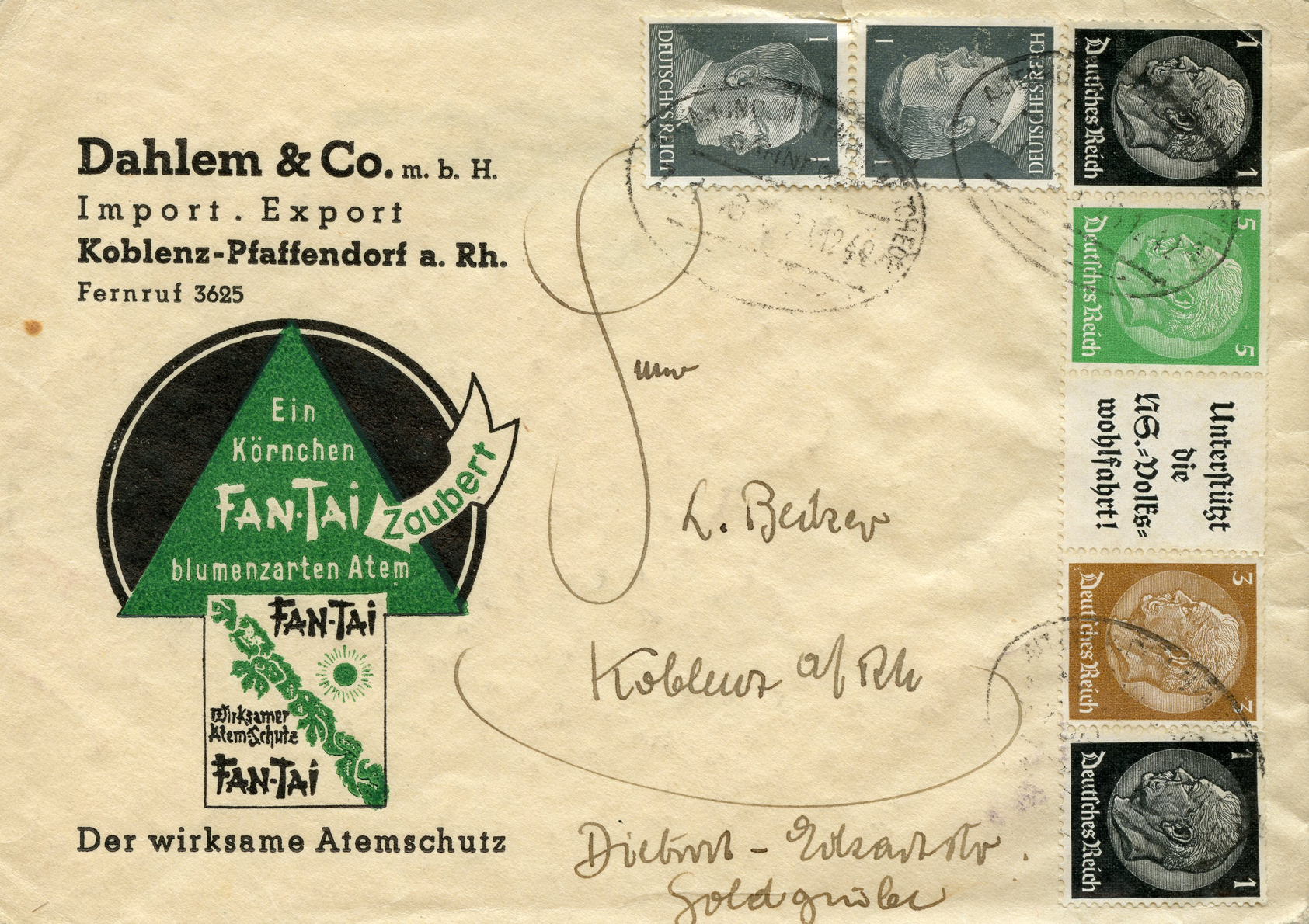
[Below: Close-up.]
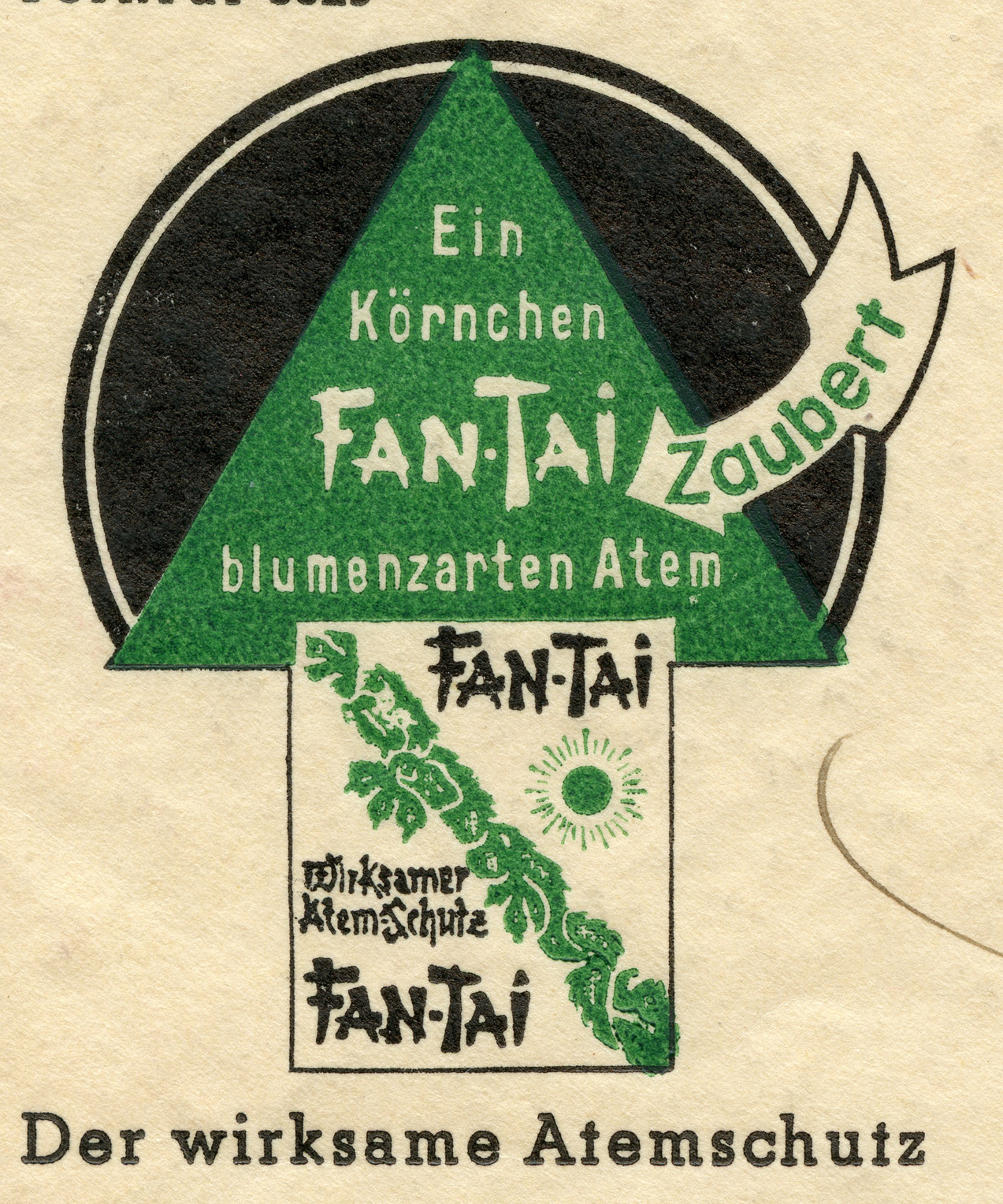
[Below: This says:
'Mehr als 50000 deutsche Fach-Einzelhändler
und 600 Fach-Großisten haben...'
(More than 50000 German specialist retailers
and have 600 specialist wholesalers).]
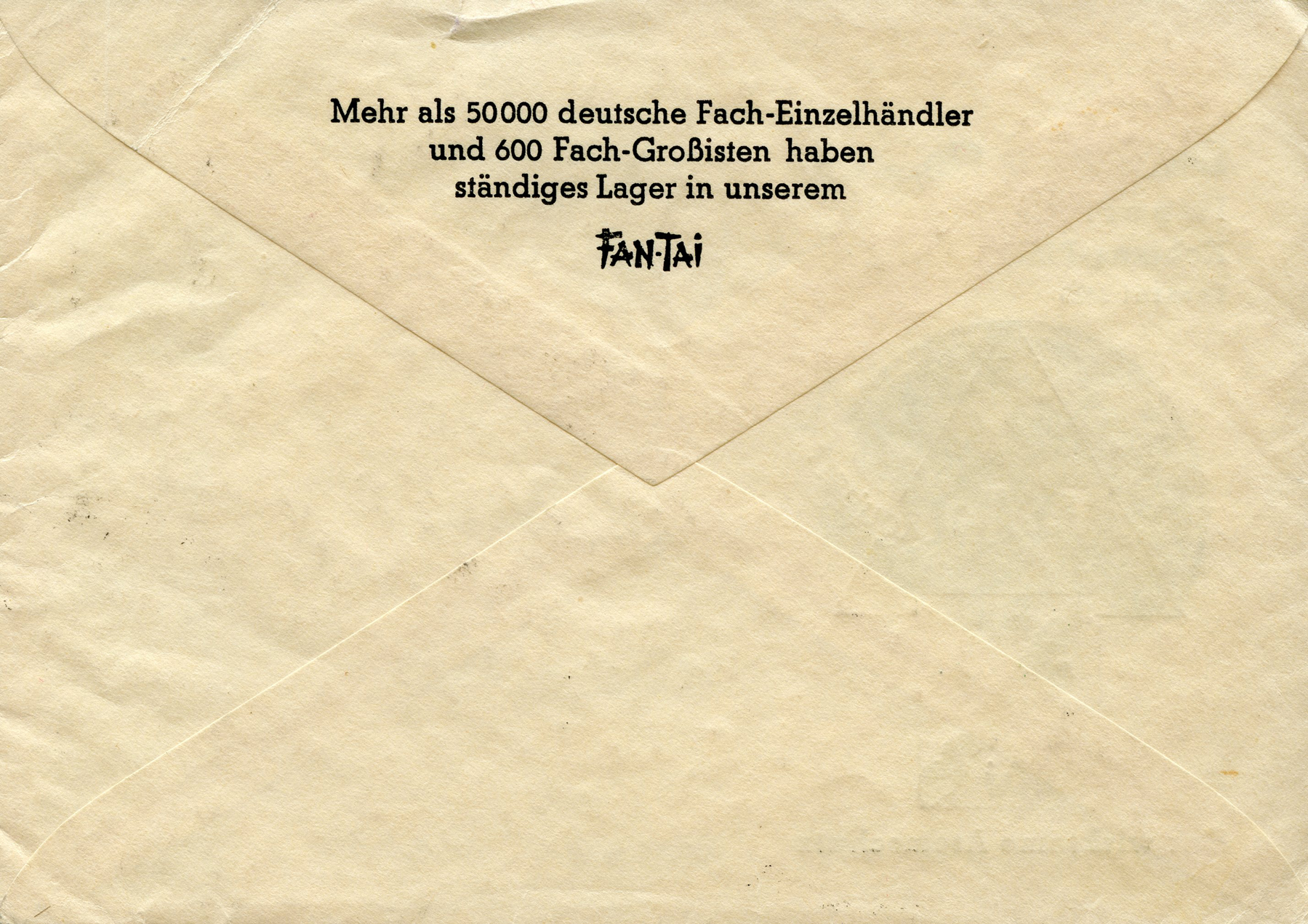
'Fan-Tai' seems to be a Chinese word. I couldn't find out what this company was. So is this company some sort of Chinese breath mints?]
[Below: Here is an advertisement taken from the Berliner Illustrierte Zeitung, June 24, 1943, number 25.]
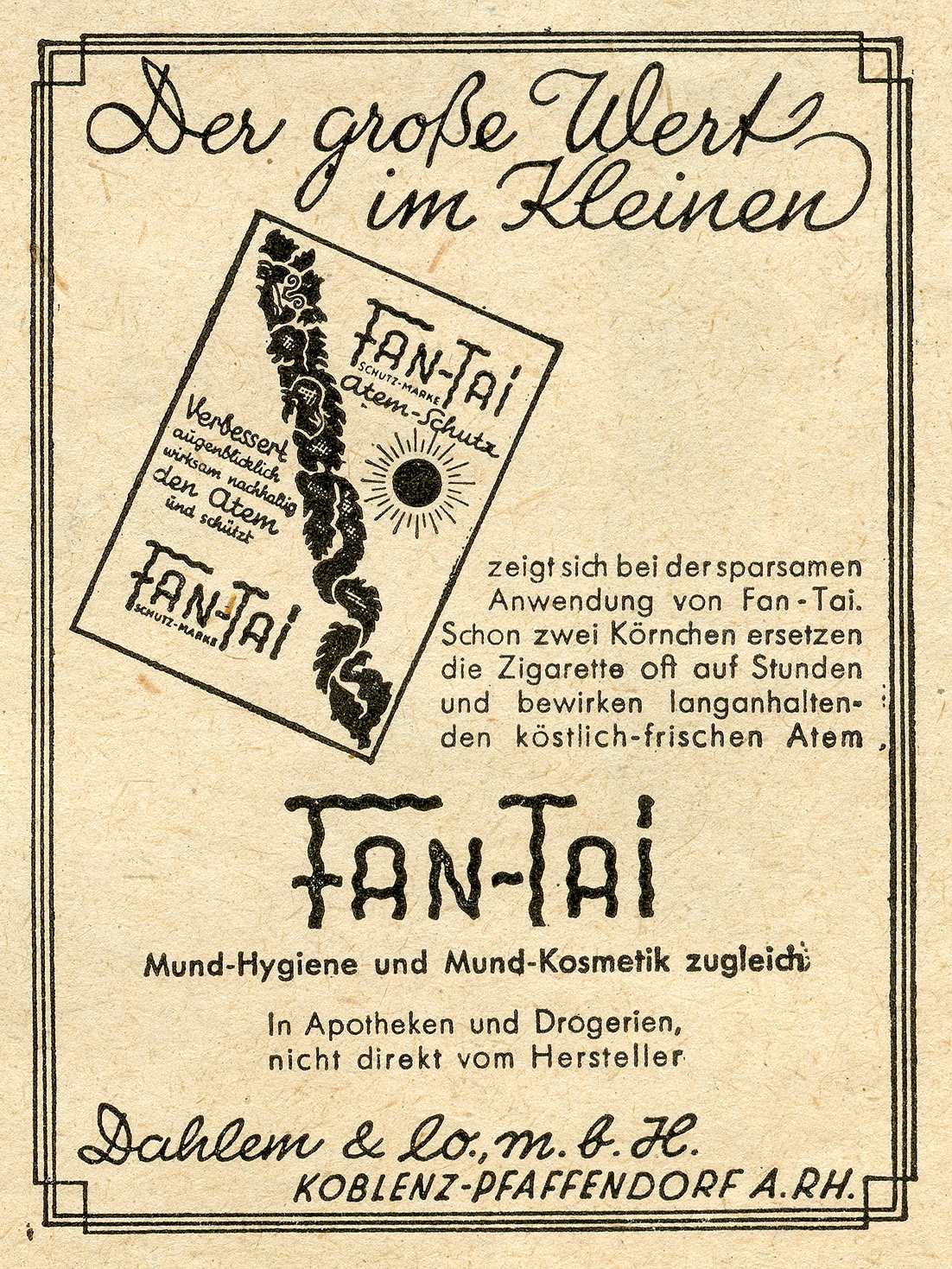

[Below: Here is an earlier envelope from the same company as above, canceled on November 24, 1937 in Koblenz. It says:
Ein
Körnchen
Sen-Sen
blumenzarten Atem
Sen-Sen
Das echte
Mund-
Parfum
Das echte vornehme
Mundparfüm.
(One
Granule
Sen-Sen
flowery breath
Sen-Sen
The real
Mouth-
Perfume
The real genteel
Oral perfume).]
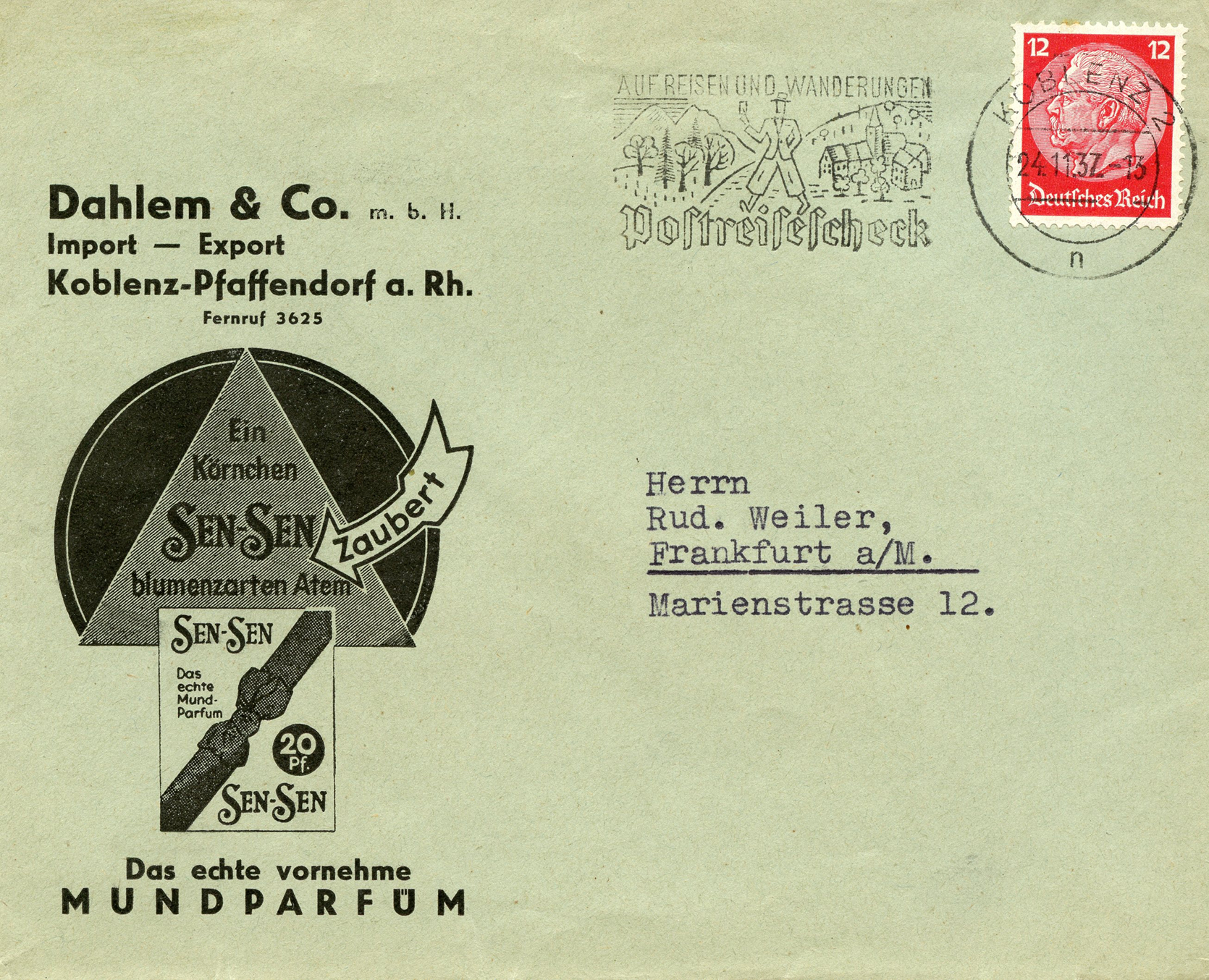
[Below: Close-up of cancel. This says:
'Auf Reisen und Wanderungen
Postreisescheck'
(On trips and hikes
Postal traveller's cheque).]
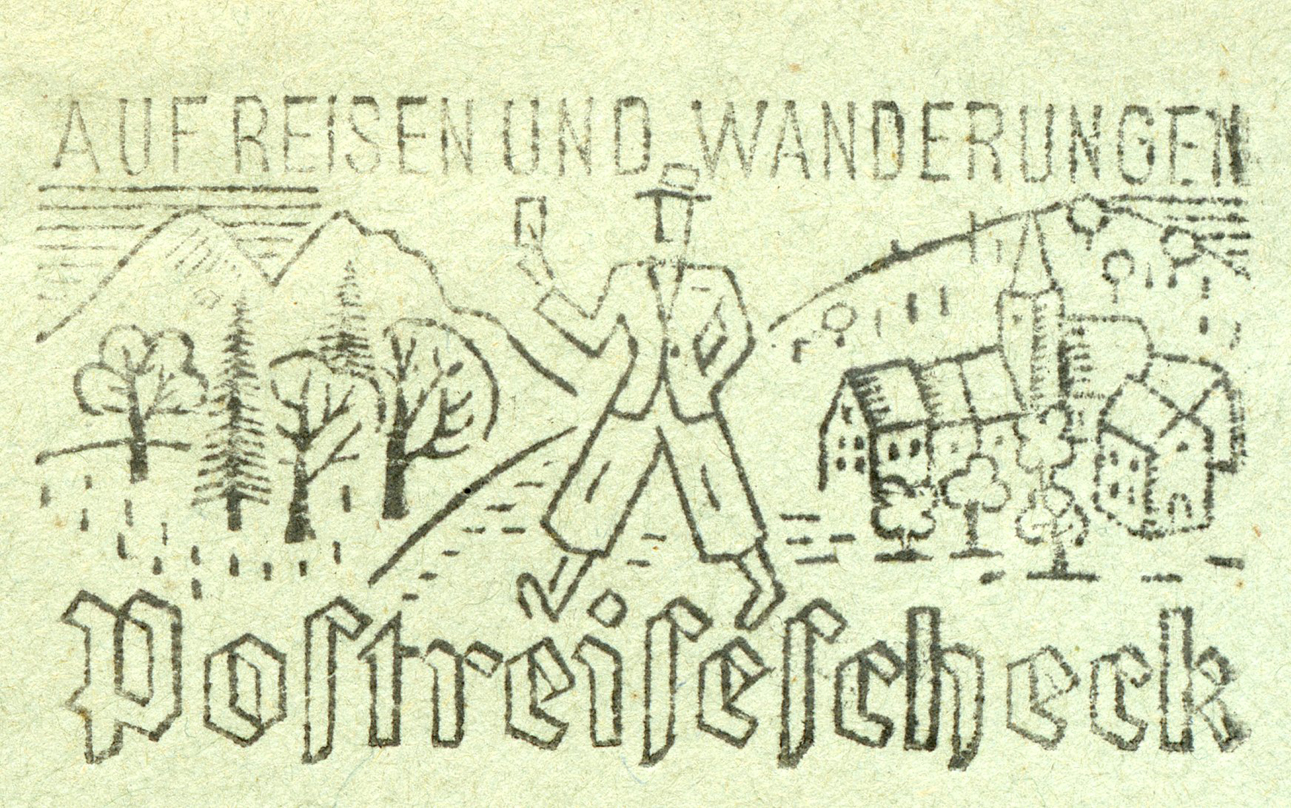
[Below: Reverse.]
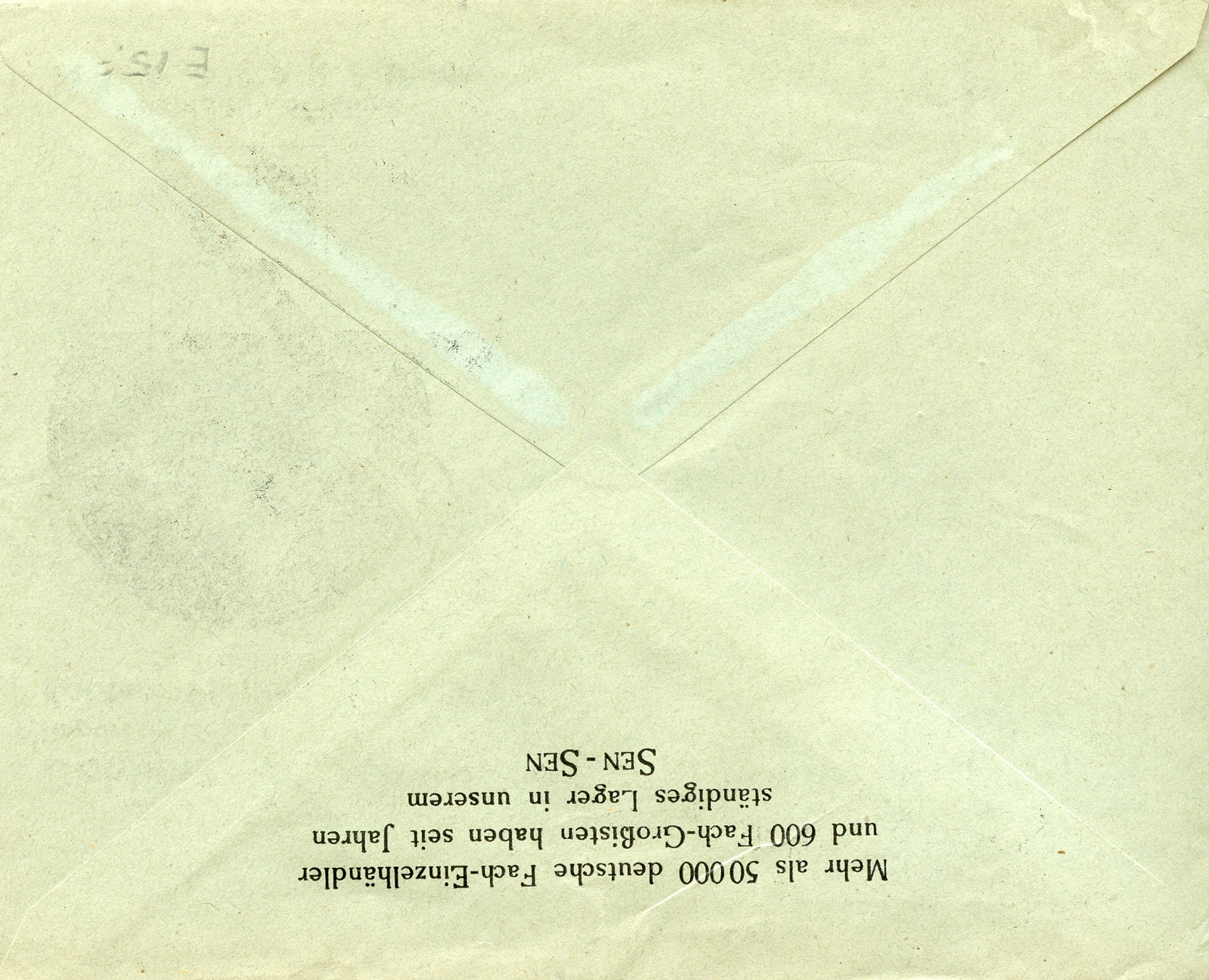

[Below: This is a neat looking postcard, canceled on September 1, 1933. It says:
'Vereinigte Frontkämpfer 1914/1918 (Träger des Deutschen Feld-Ehren-Zeichen)'
(United Front Fighters 1914/1918 (Bearer of the German Field Medal of Honor).]
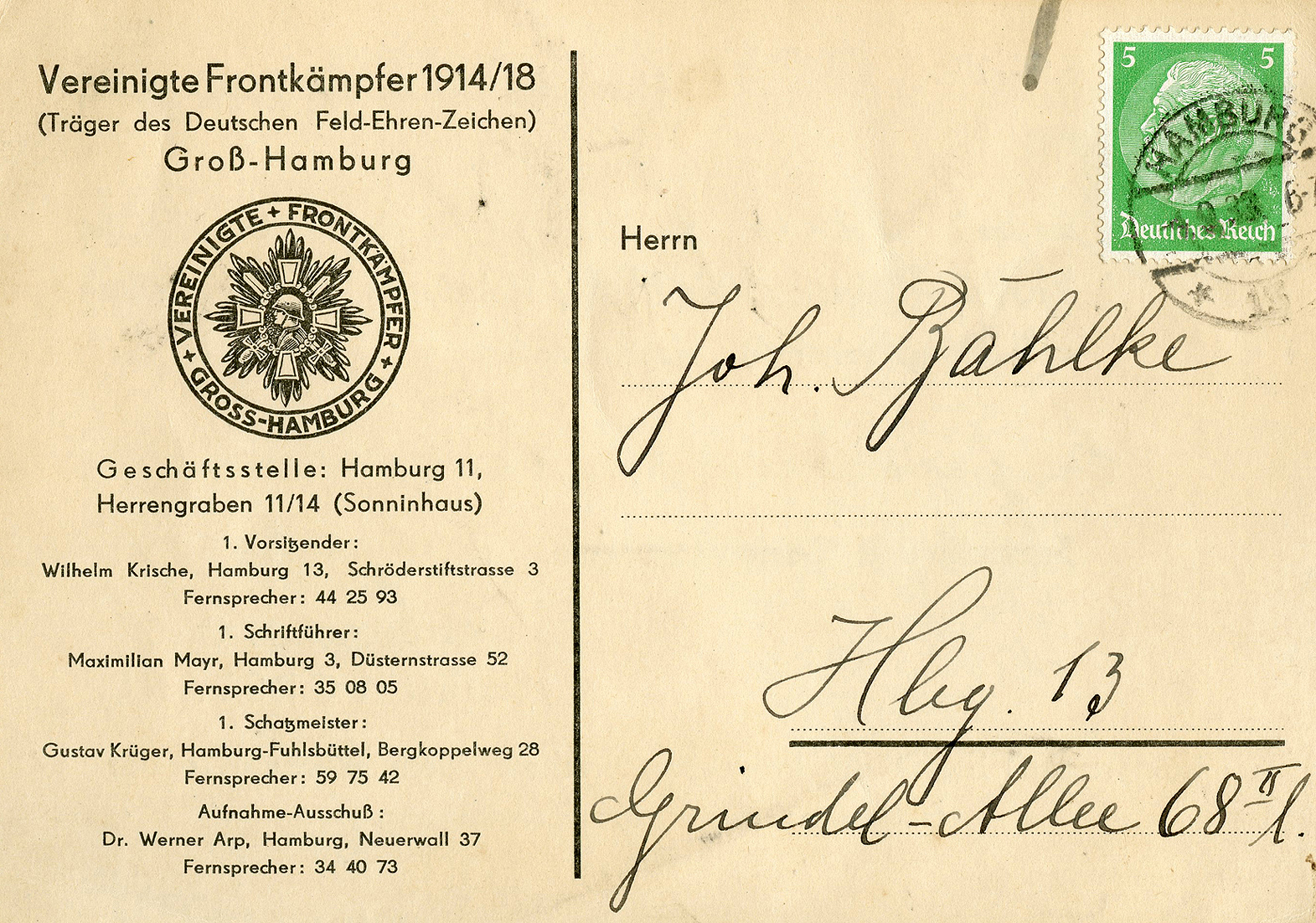
[Below: Close-up. There is a medal that looks like this.]
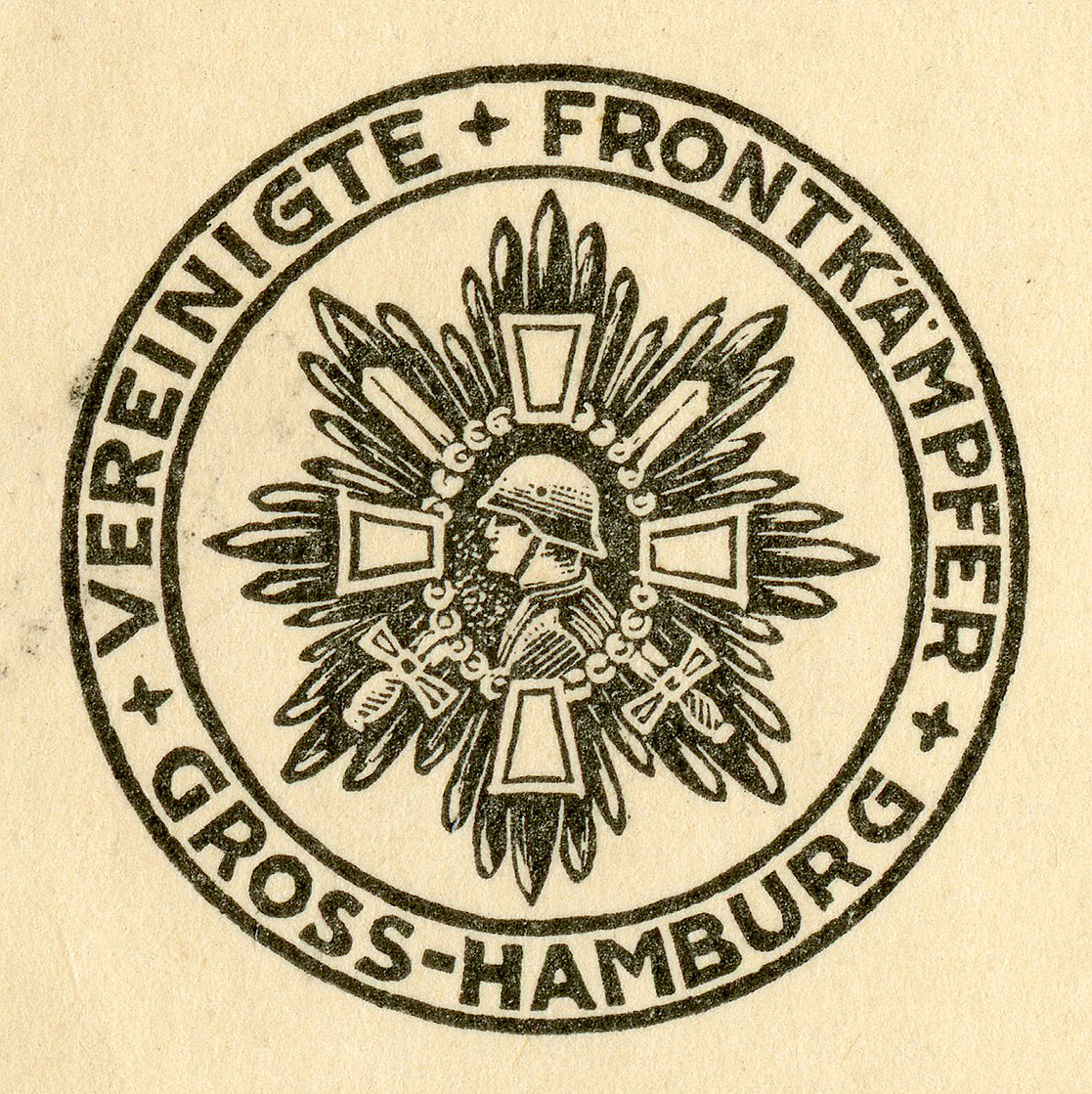
[Below: Reverse. It says:
'Einladung
zu der am 7 Sept abends 8 ½ Uhr, im
Hotel "Rheinischer Hof" Holzdamm 51(2 Minuten
vom Hauptbahnhof) stattfindenden
[...]
Kameraden! Stärkt die Frontkämpferschaft durch Werbung neuer
Mitglieder für unsere Vereinigung.'
(Invitation
to the meeting on Sept 7th in the evening at 8:30, in the
Hotel "Rheinischer Hof" Holzdamm 51 (2 minutes
from the main station)
[...]
Comrades! Strengthen the front-line combat by recruiting new
members for our association.)]
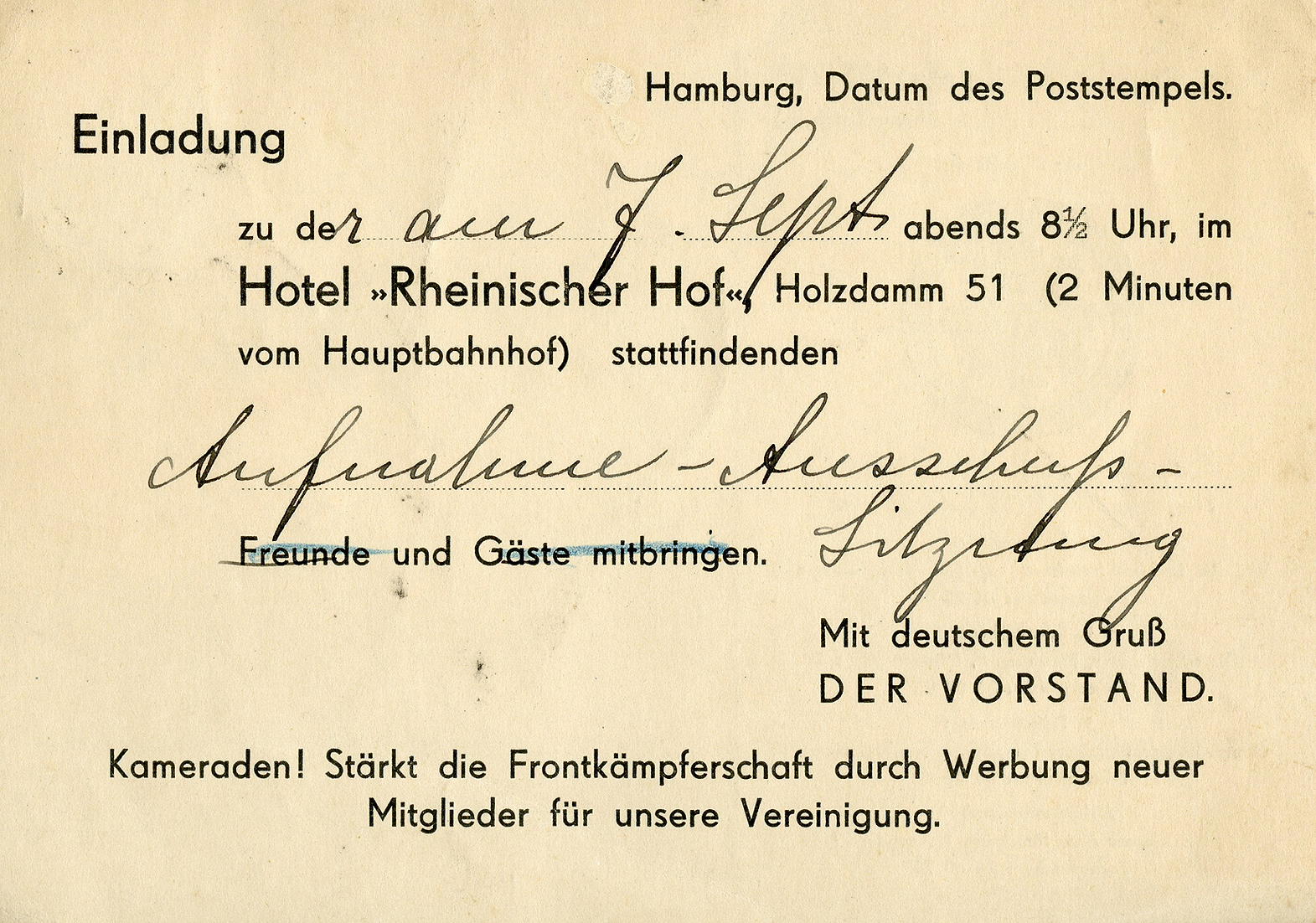

[Below: This was canceled on July 3, 1939 and sent to Latvia from the Steyr company. Steyr is a motor company that has been around for over 150 years. They are located in the beautiful town of Steyr, Austria, although this envelope was sent from an address in Berlin. It says:
'An die
Chefredaktion
"Illustreta Rachnika
Motors un Sports" '
(To the
Editor-in-Chief
Illustreta Rachnika
Motors and Sports')]
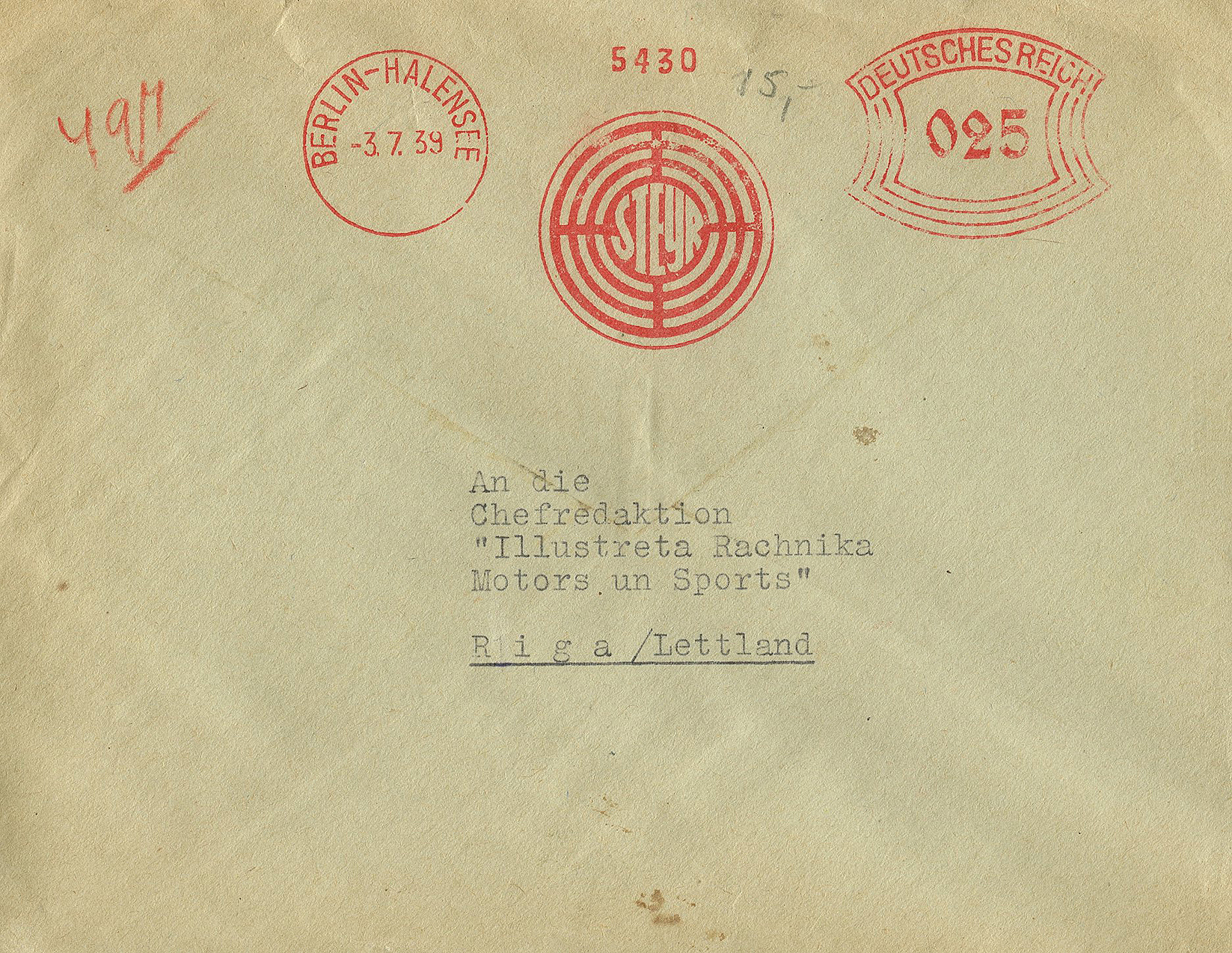
[Below: Close-up.]
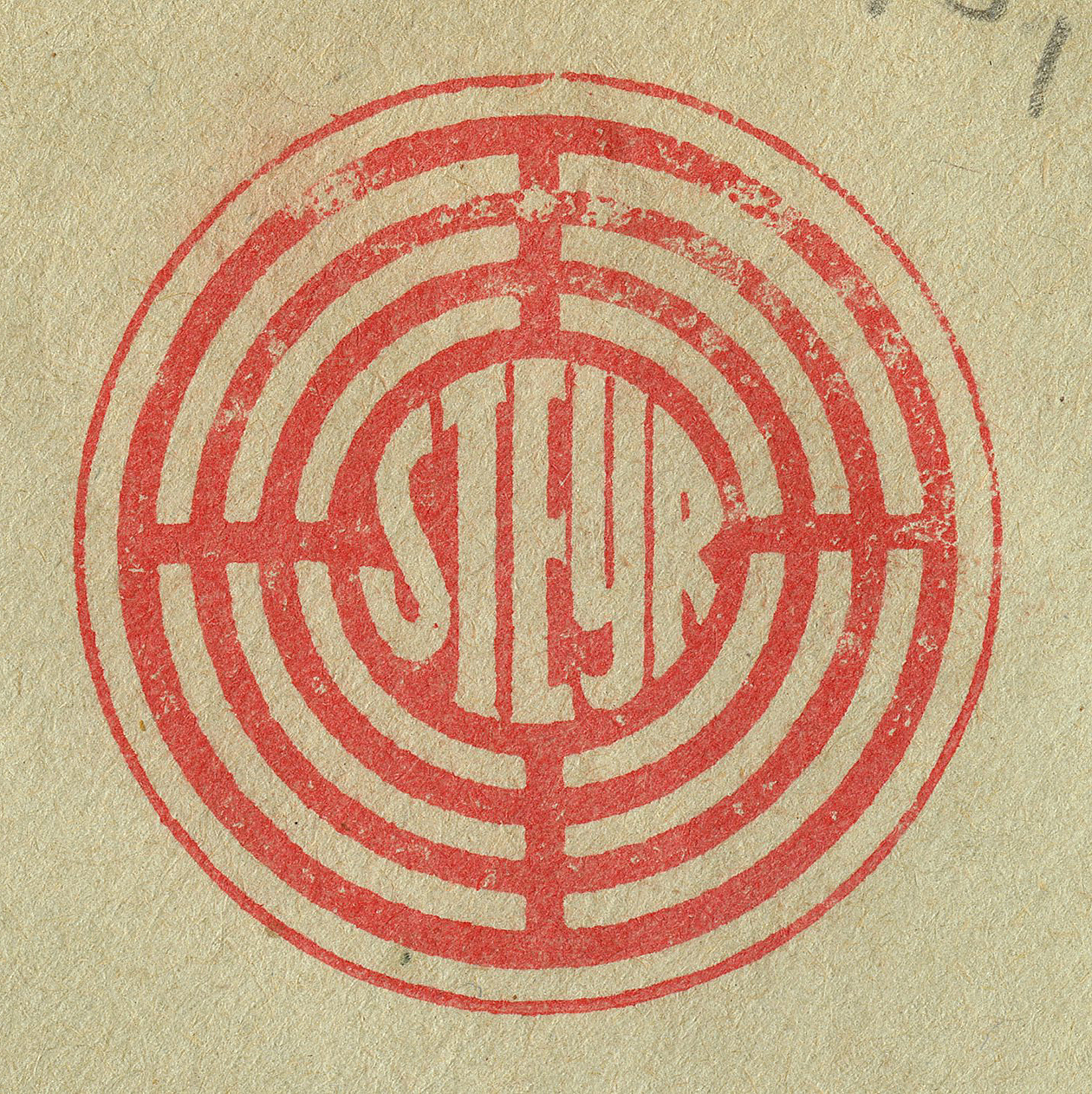
[Below: Envelope reverse.]
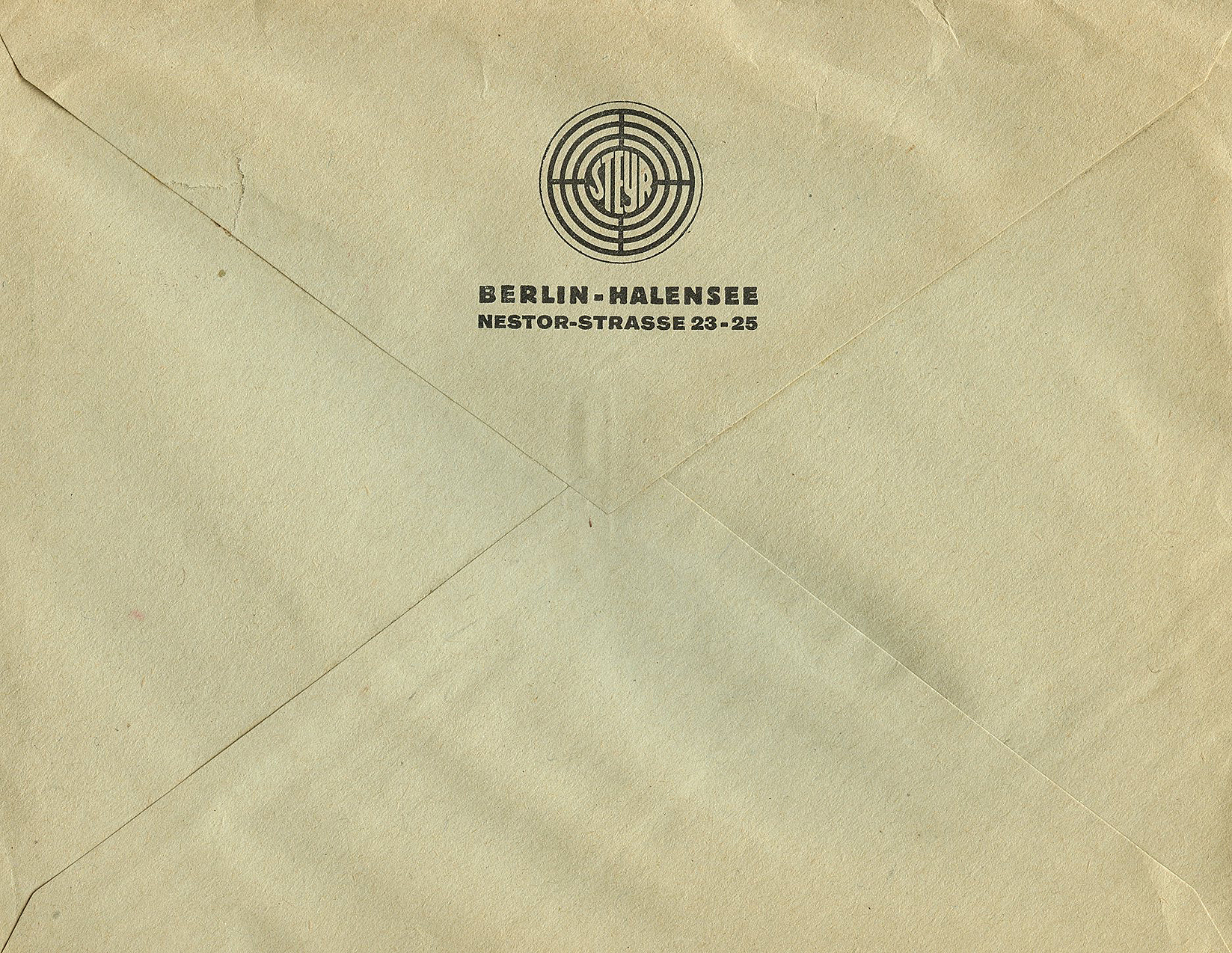
[Below: Close-up.]
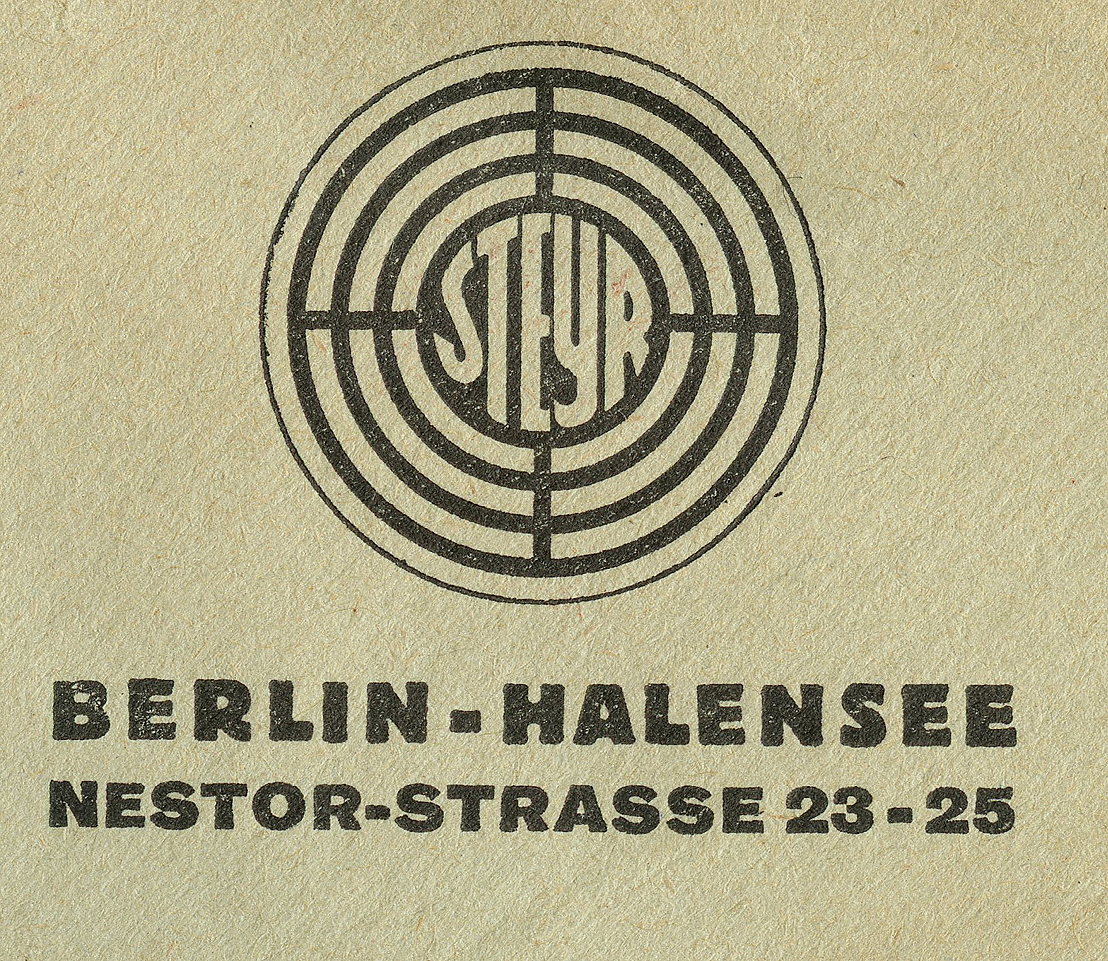

[Below: This was canceled on October 12, 1929. It says:
'Internationale Hygiene Ausstellung Dresden'
(International Hygiene Exhibition Dresden).]
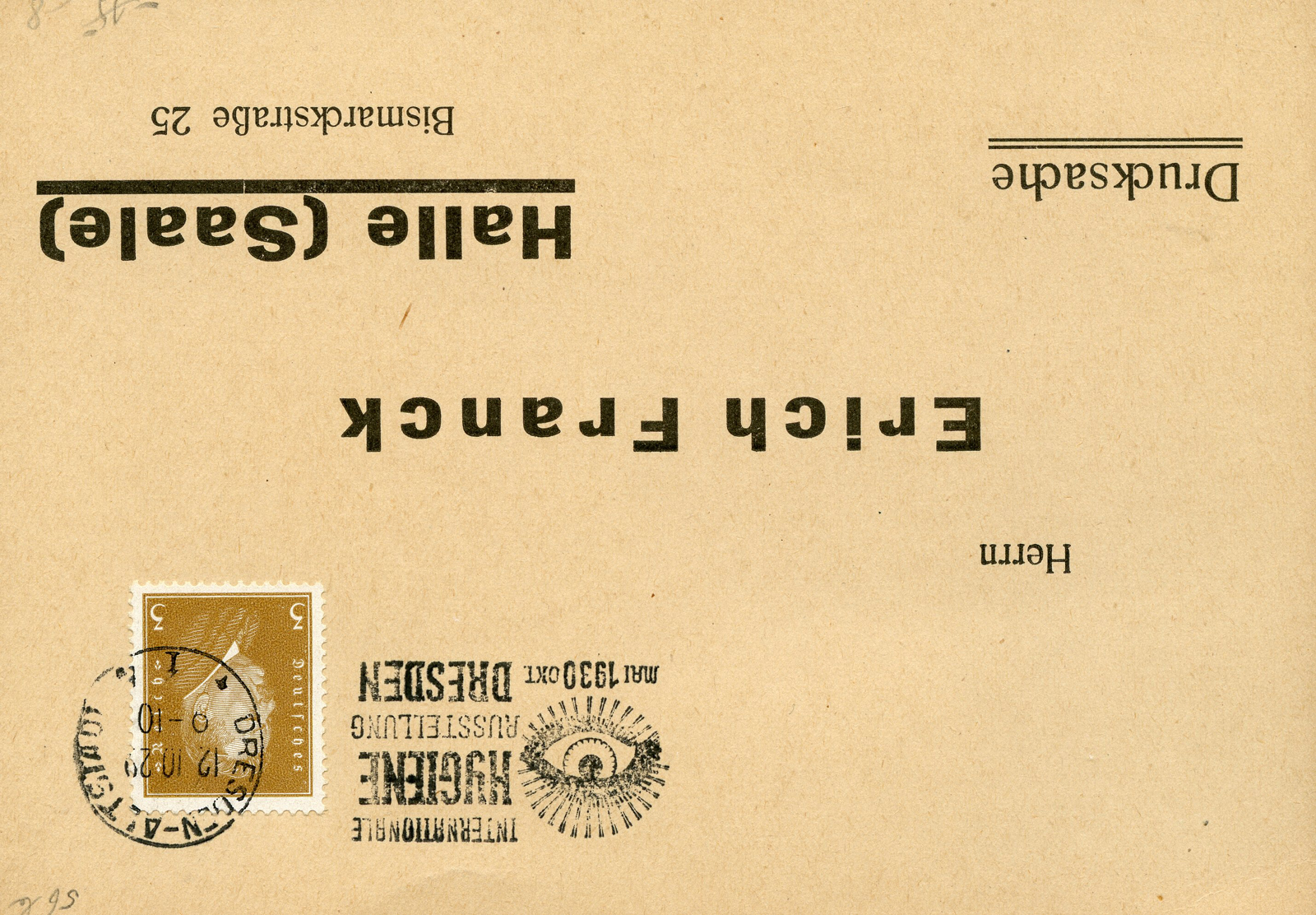
[Below: Close-up.]
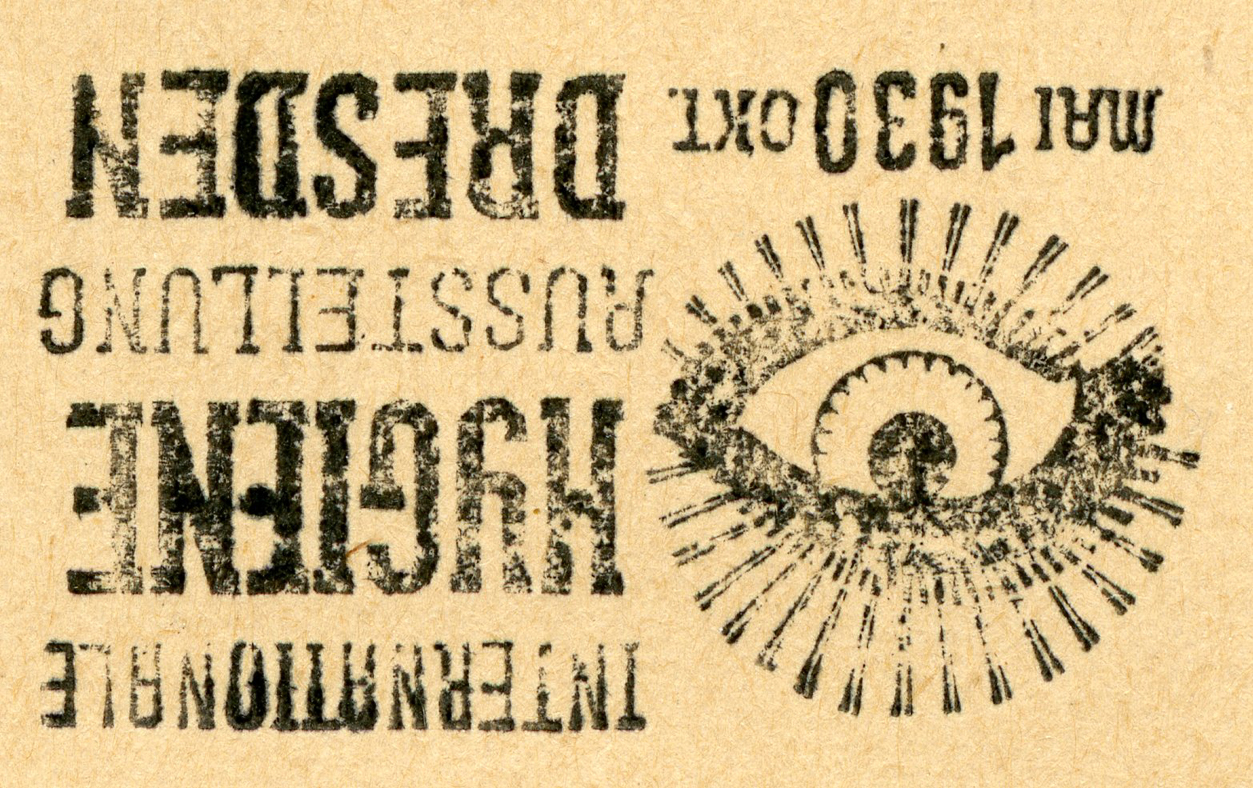

[Below: Here is another eye-related envelope. Osram is still in operation, now called Osram Sylvania and is based in the USA. This was canceled on November 9, 1935. It says:
'die Neue Hochleistungs Lampe'
(the new high-performance lamp).]
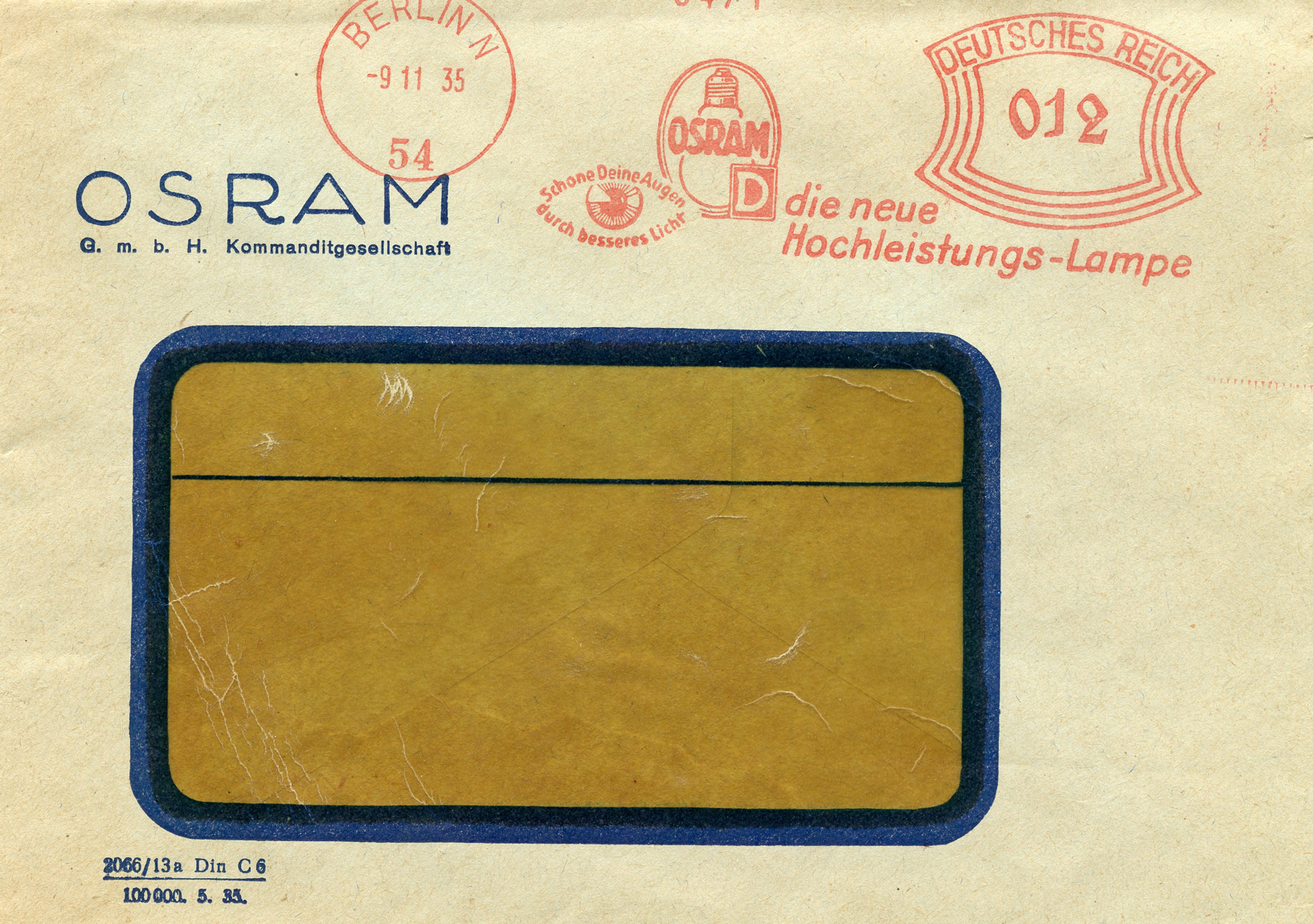
[Below: Envelope reverse.]
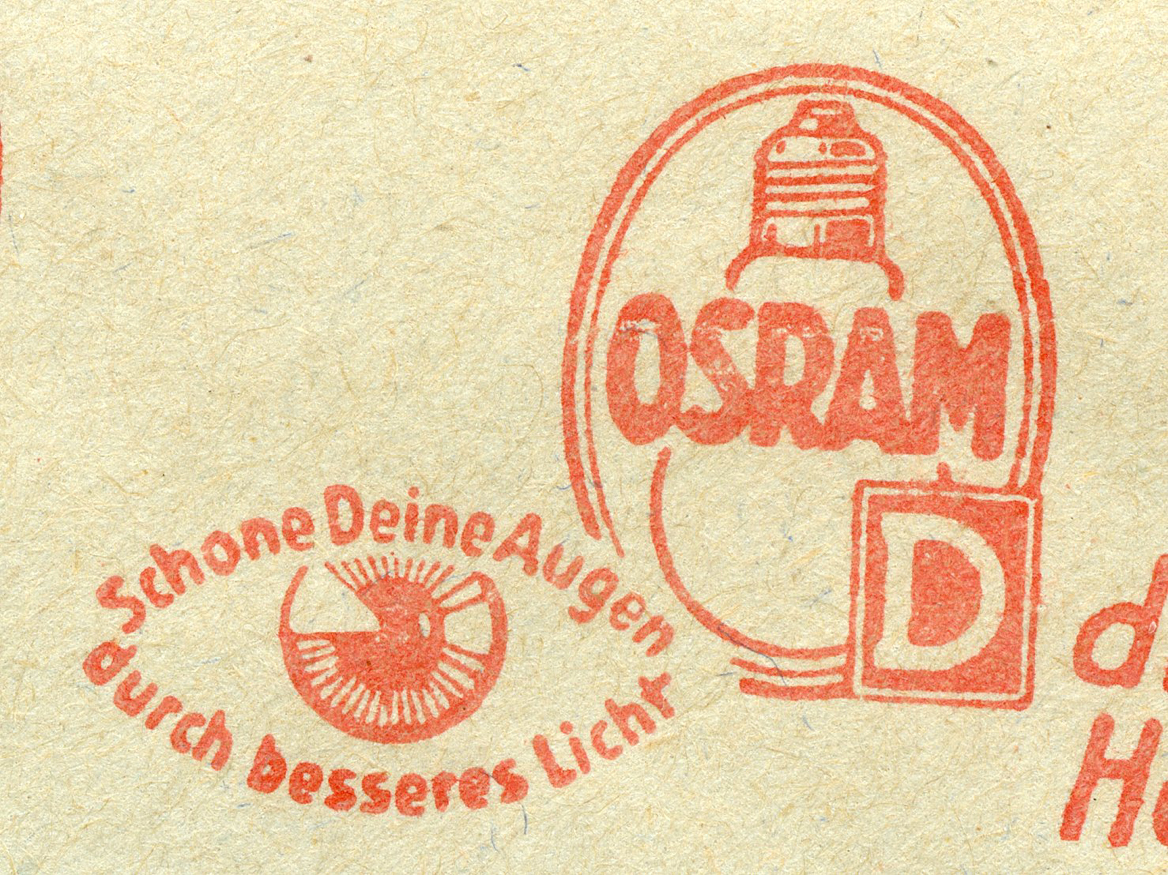
[Below: Close-up.]
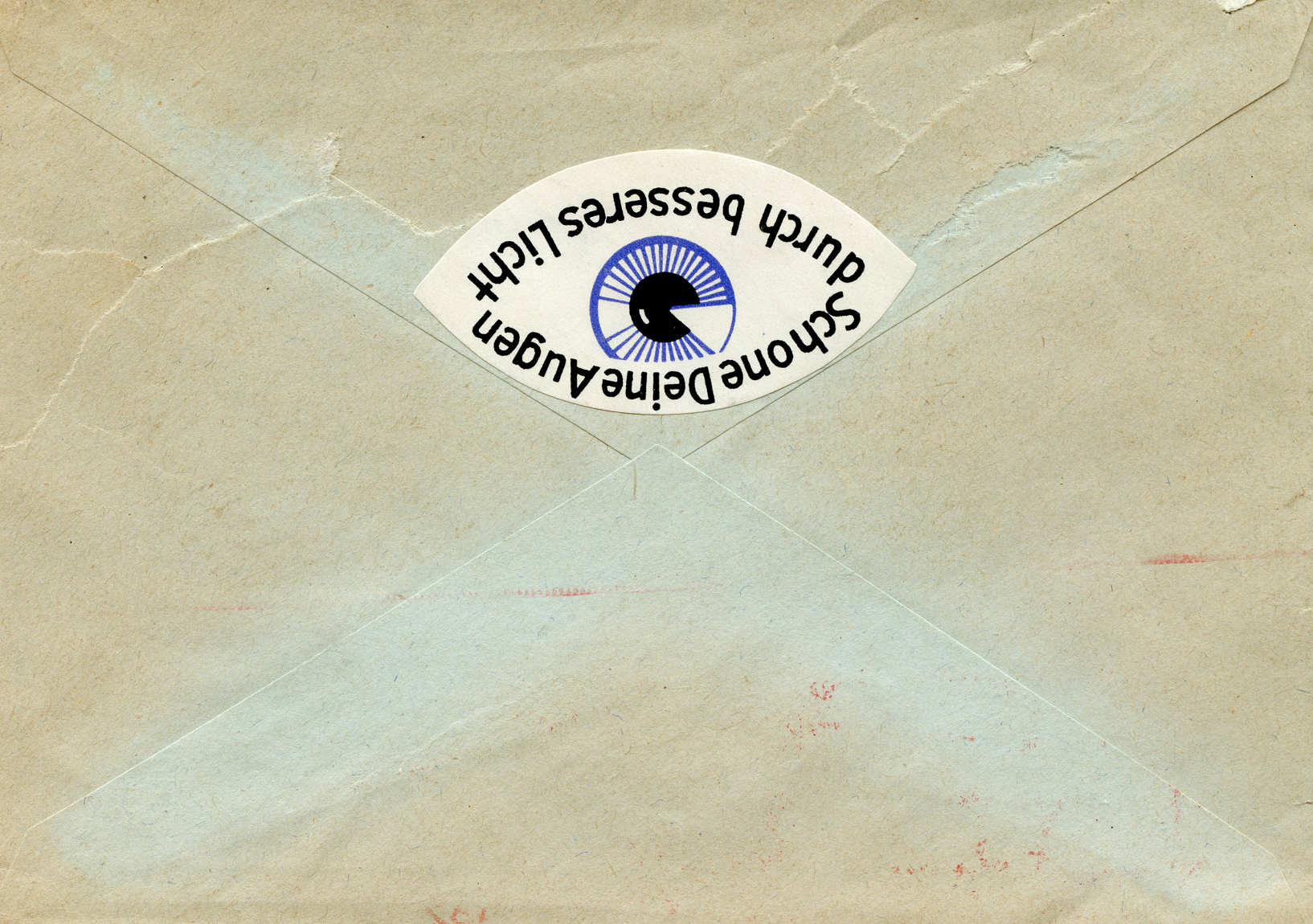

[Below: Another eye-related envelope. This one is from Hungary and was postmarked in 1972.]
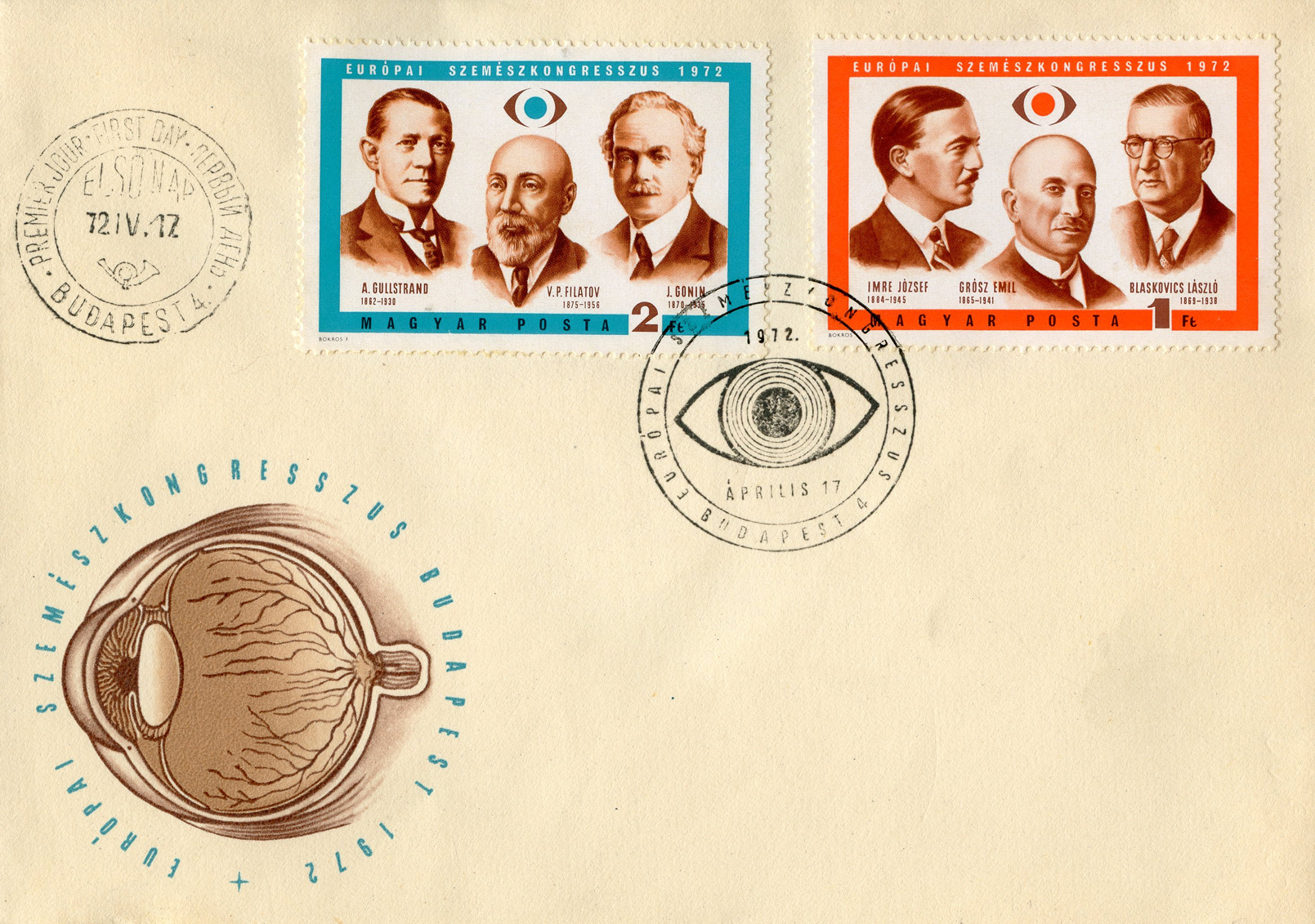
[Below: Close-up.]
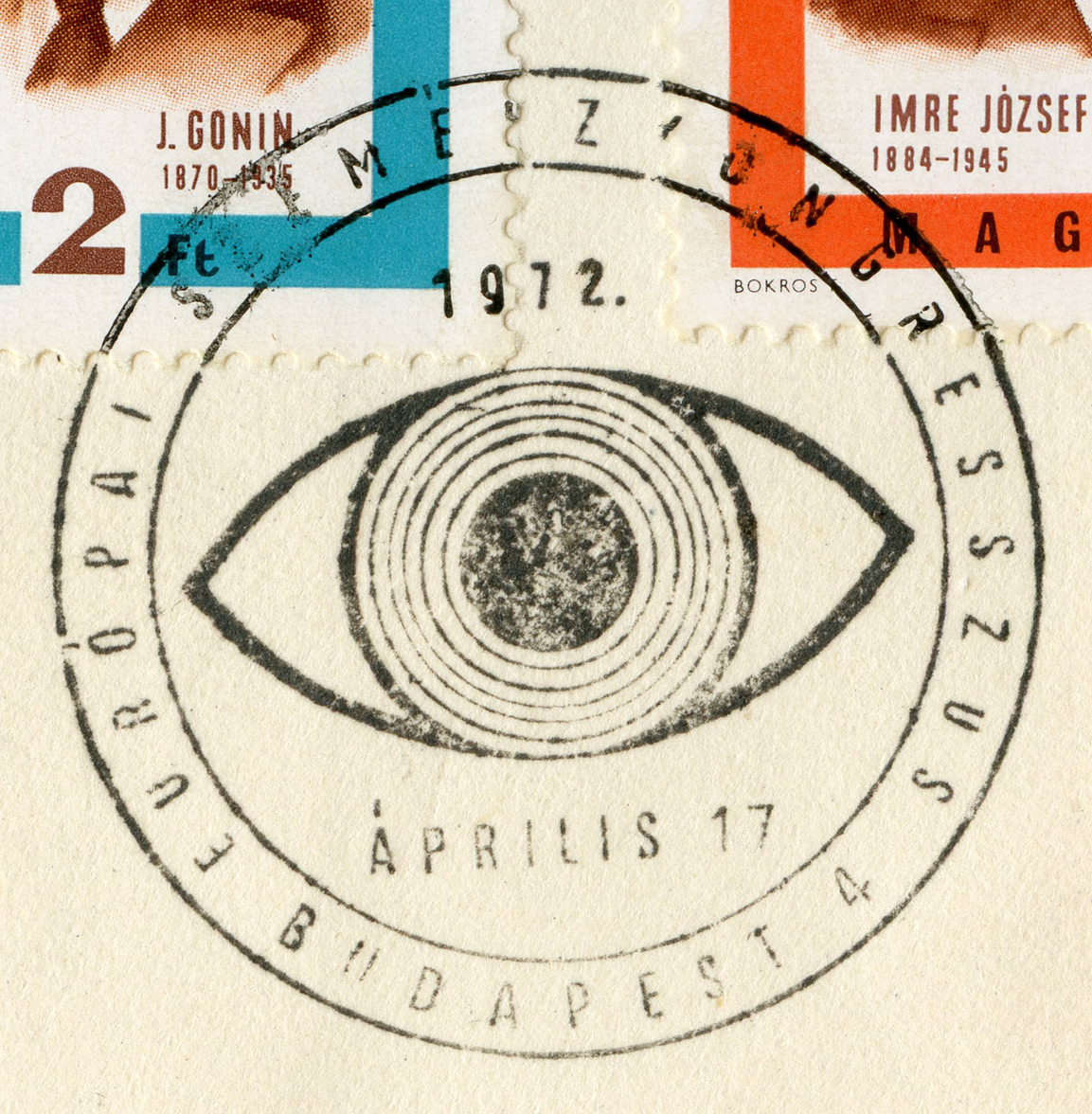

[Below: ...]
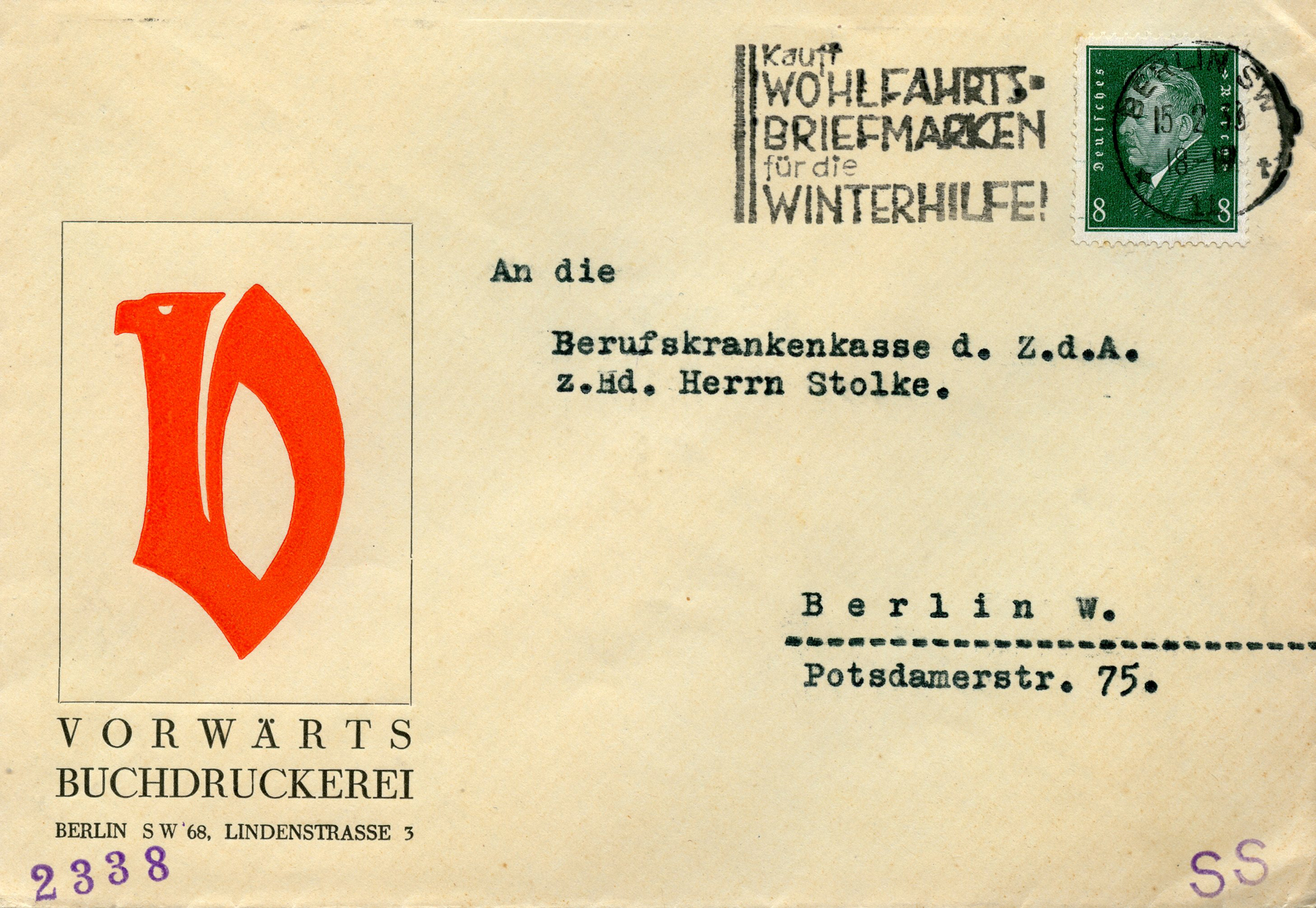
[Below: Close-up.]
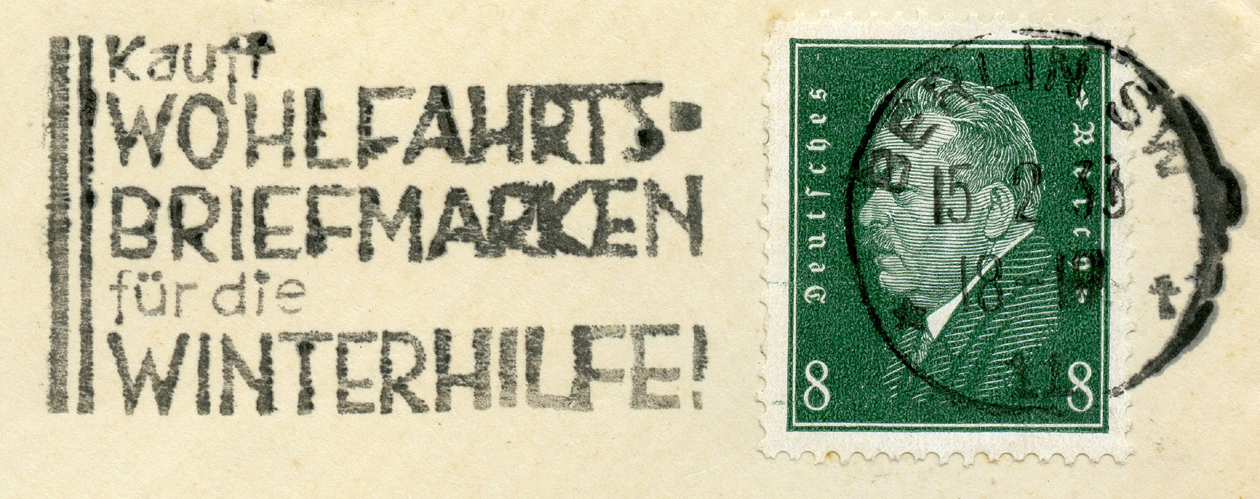
[Below: Close-up.]
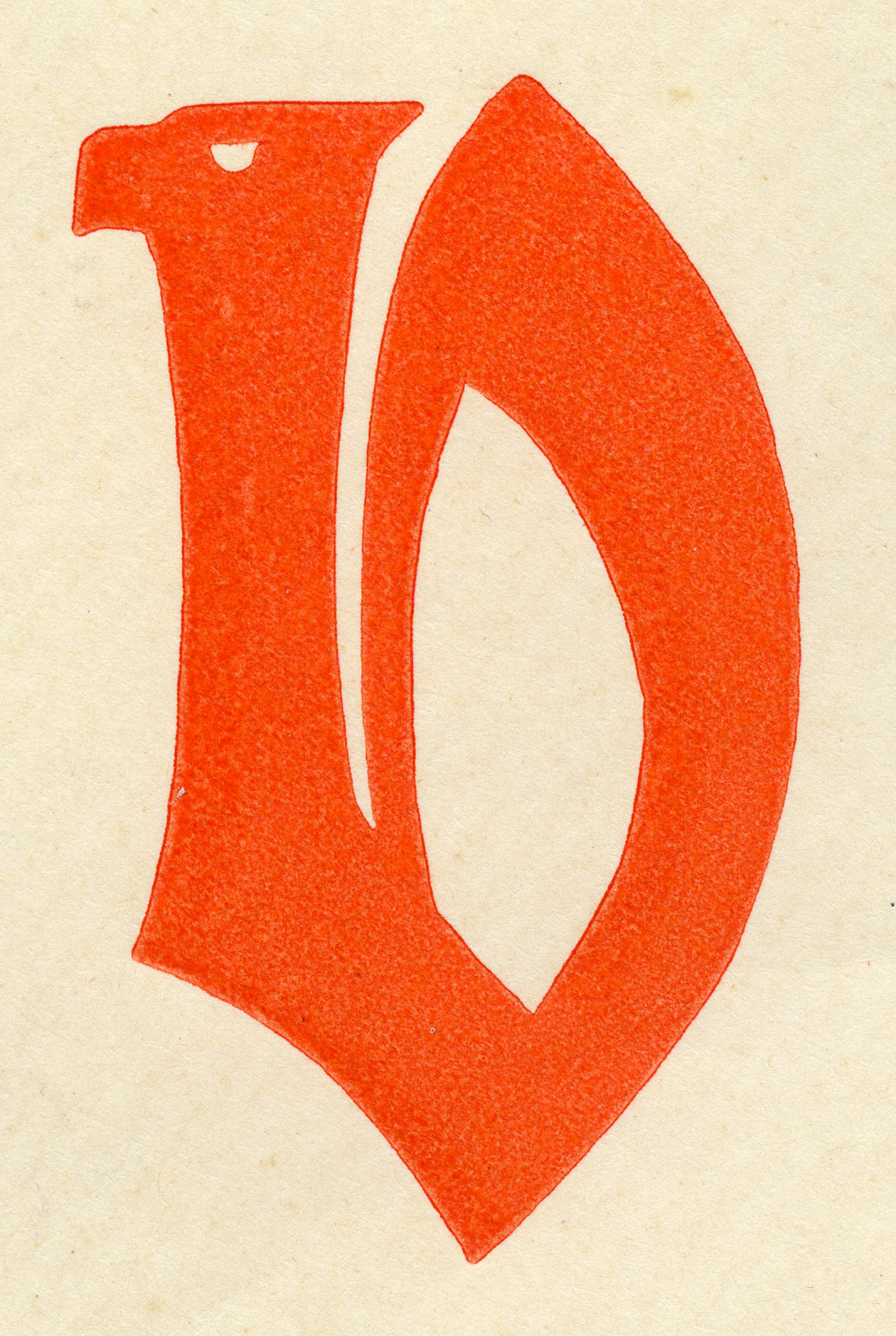

[Below: ...]
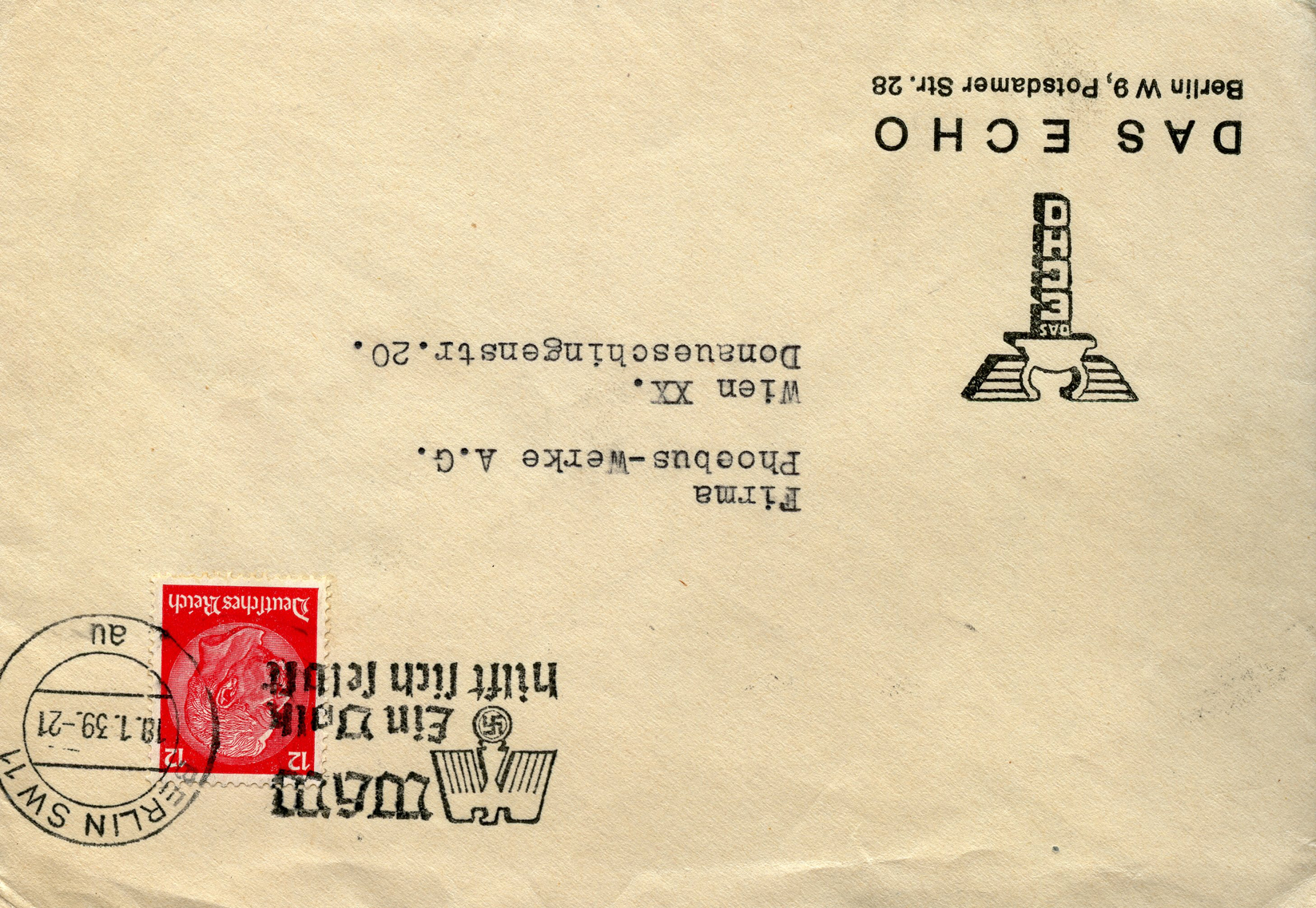
[Below: Close-up.]
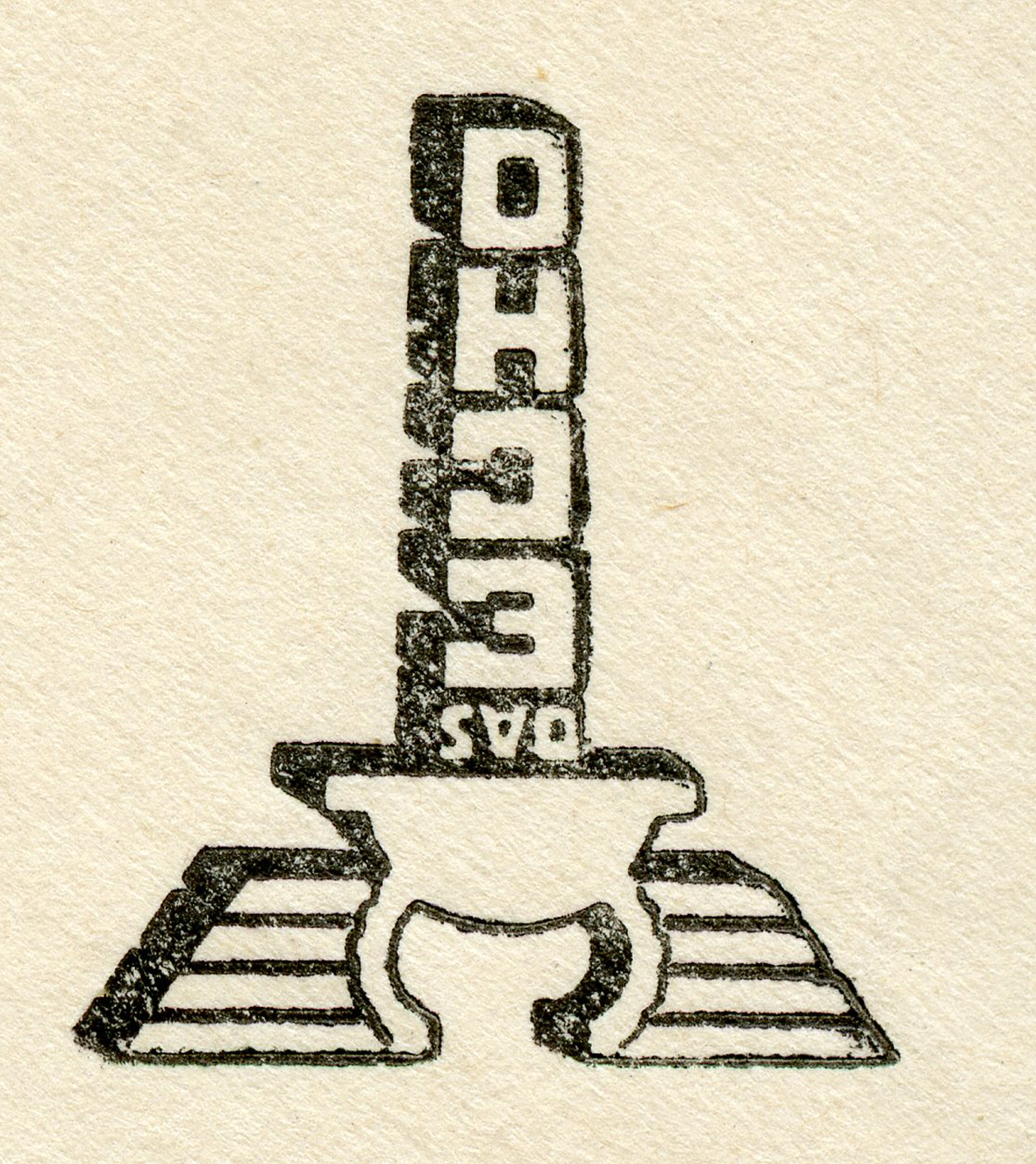
[Below: Close-up.]
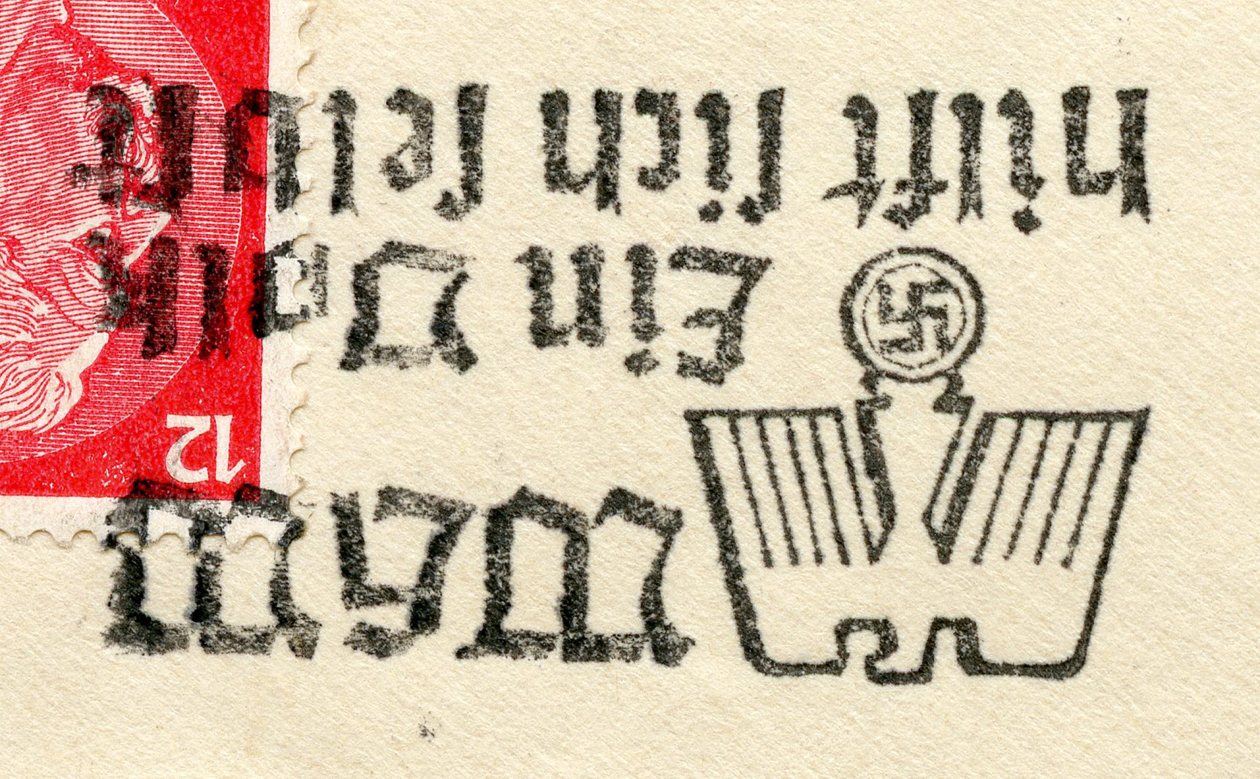

[Below: ...]
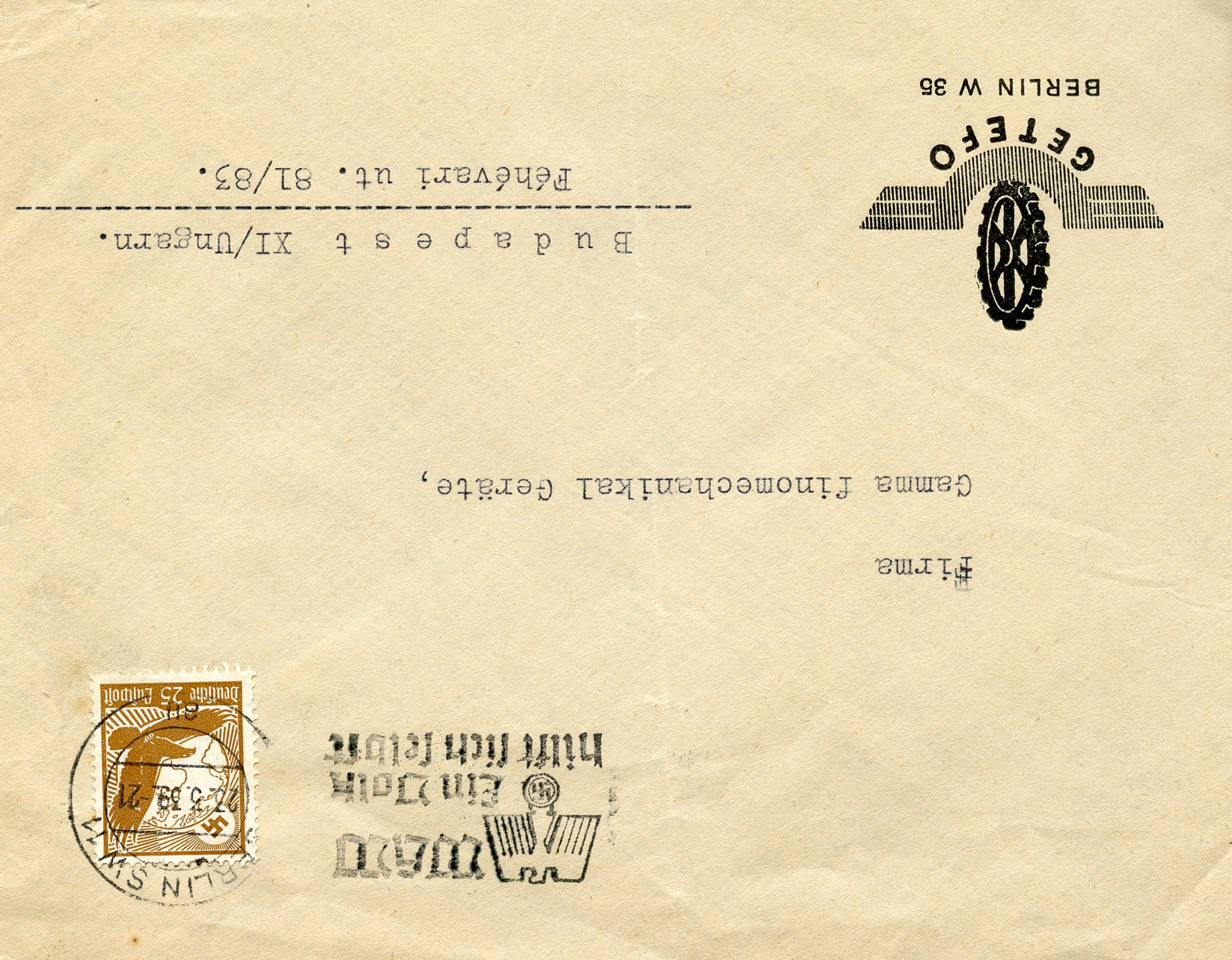
[Below: Close-up.]
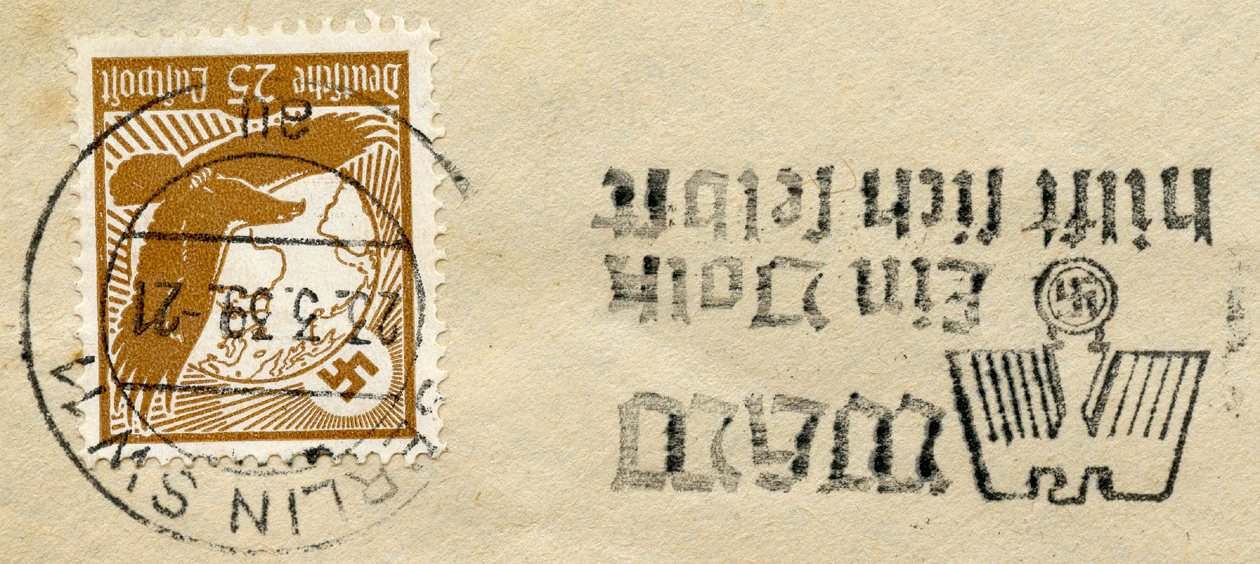
[Below: Close-up.]
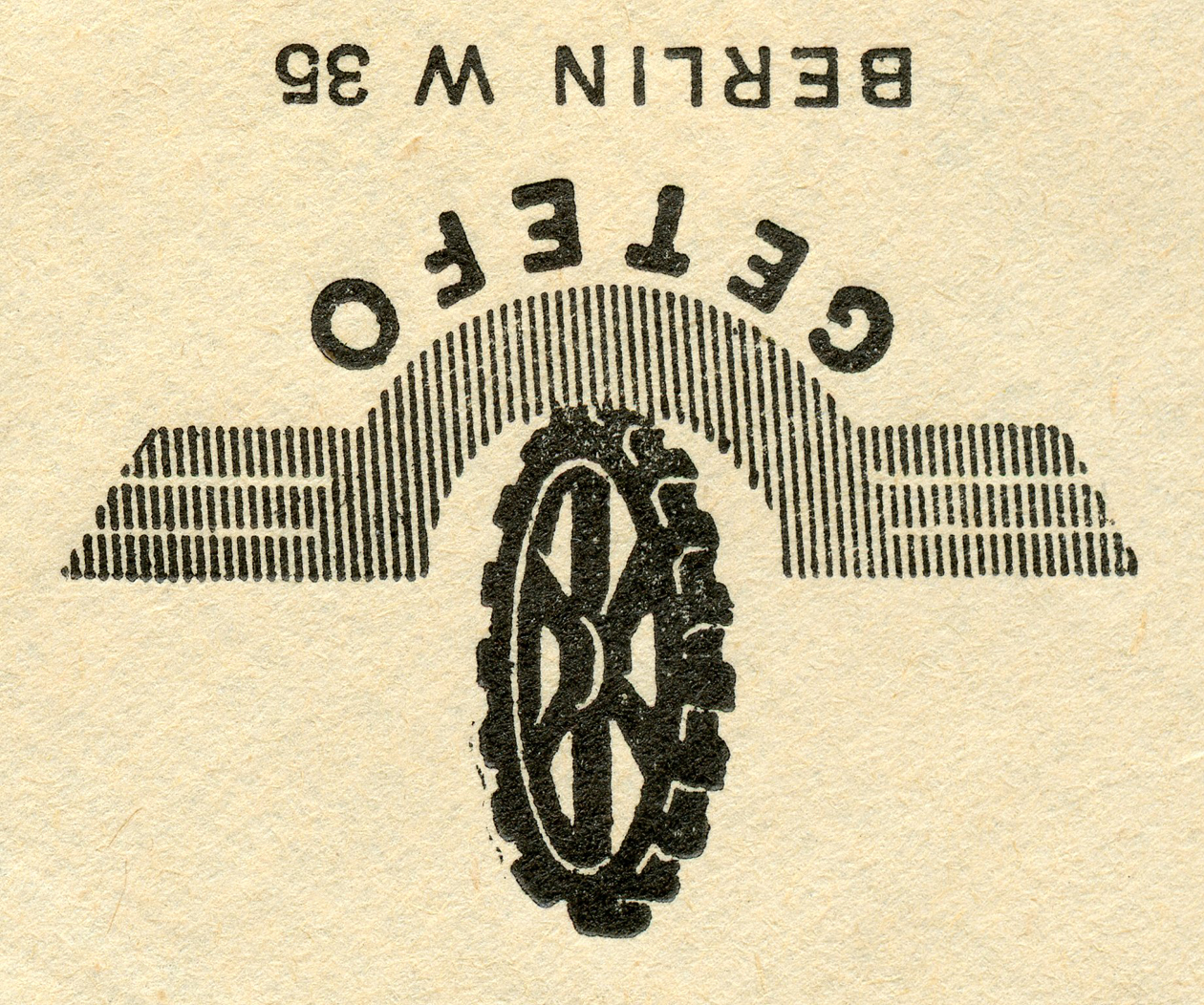

[Below: ...]
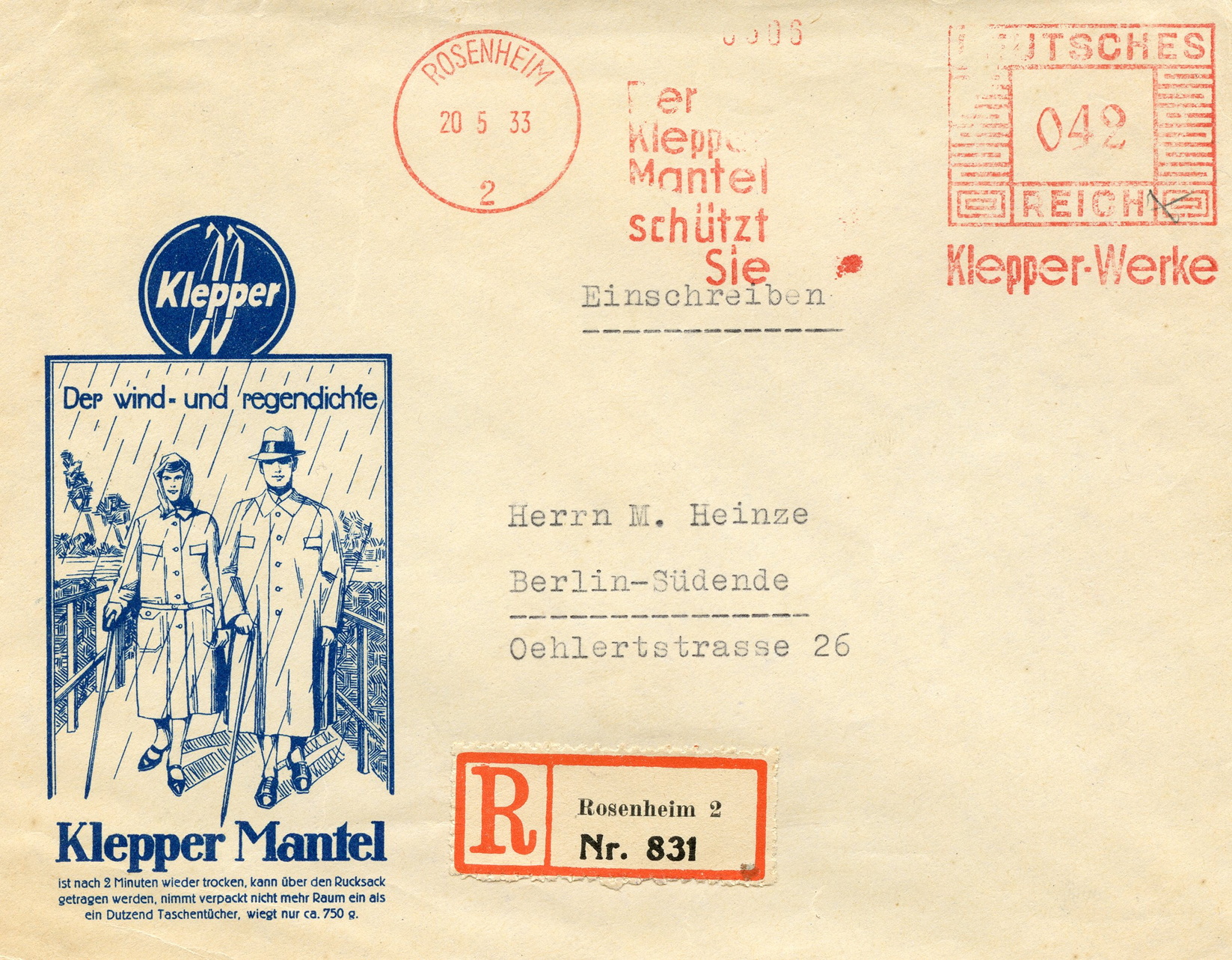
[Below: Close-up.]
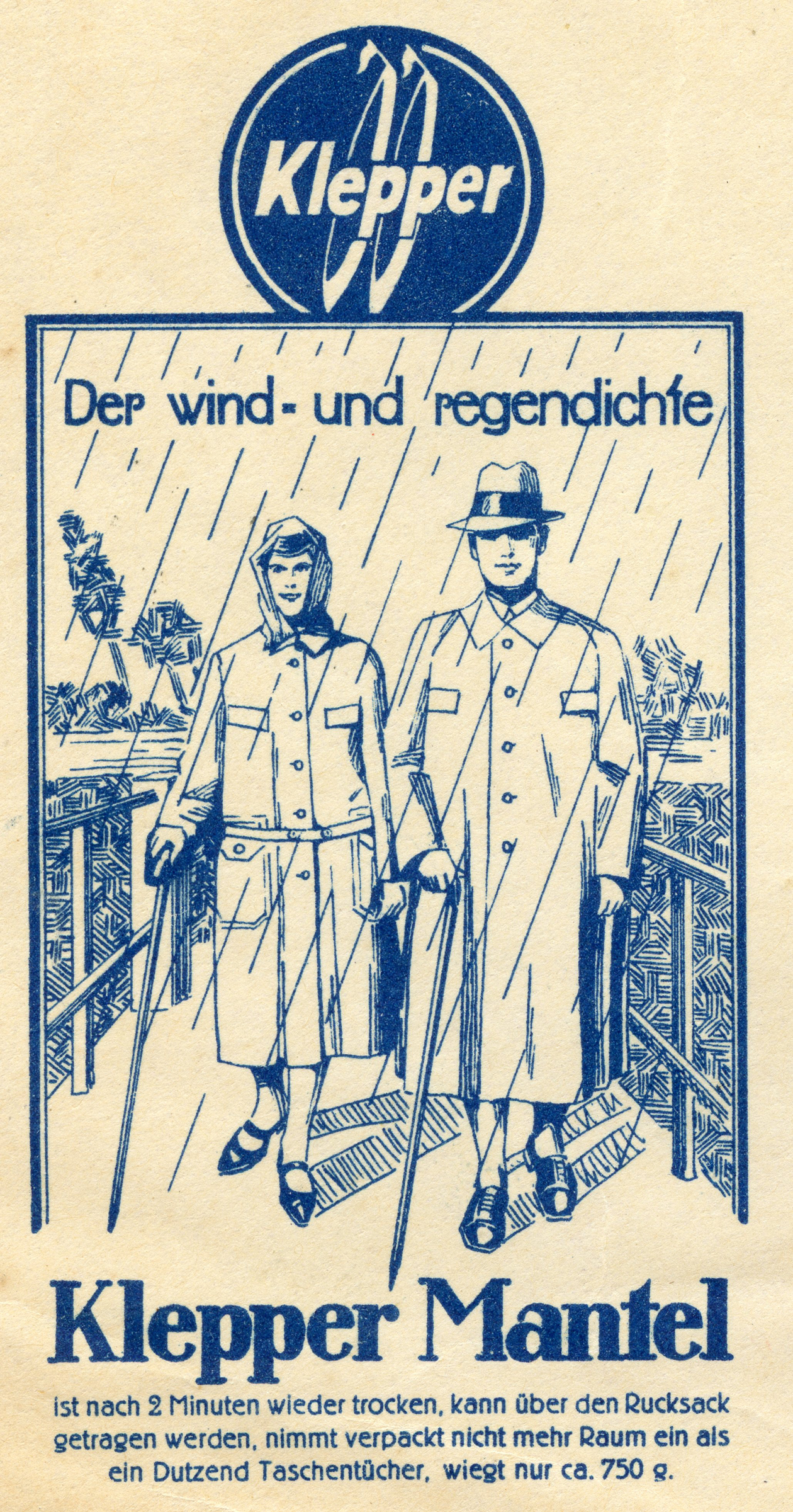
[Below: Reverse.]
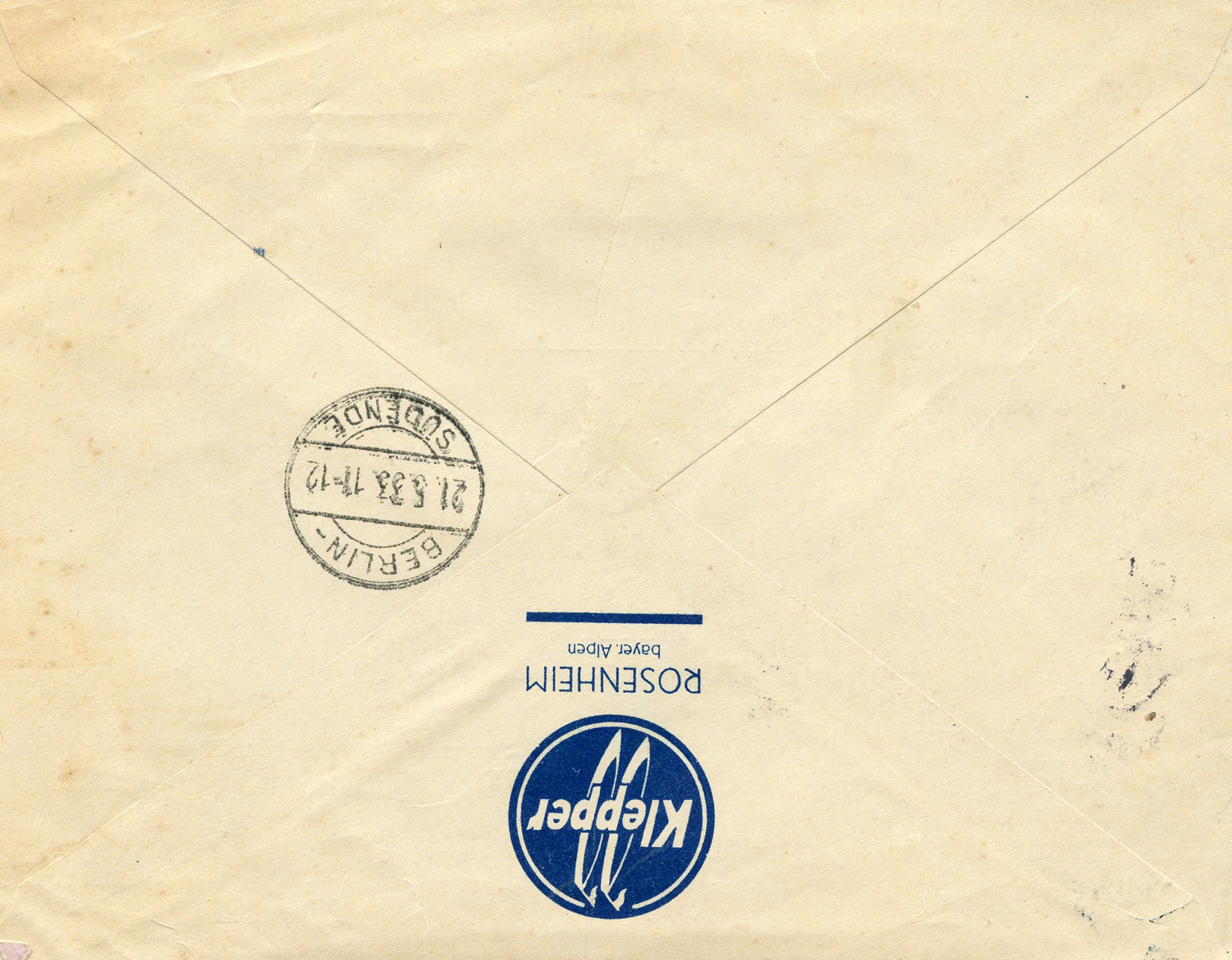

[Below: Here is an odd postcard that uses shorthand. It was sent in August of 1943. By this time the whole world was censoring international mail, I wonder what would happen if someone tried to send a letter using shorthand? I mean, a censor would have to be able to read it... This was sent within Germany to Koblenz. I'd love to be able to know what this says, perhaps one day someone with the ability to read shorthand (and German) will let us know what it says?]

[Below: Reverse of postcard.]


[Below: How can you not like this charming postcard? This is a 1942 Feldpost card sent by a soldier at the front (you can tell by the lack of a postage stamp and field ink stamps on the back. This says 'Gruss aus Leer', or Greetings from Leer (a town in Lower Saxony, Germany.]

[Below: Reverse of postcard.]

